|
Texas Governor Greg Abbott (R) recently signed into law the tax relief compromise by the Legislature’s second special session. This relief is historic with the country’s largest tax cut and the largest net tax cut in Texas history.
But it falls short of what Texans were promised of the largest property tax cut in the state’s history, as it’s instead the state’s second largest property tax cut because of the largest spending increase in Texas history. Rather than providing substantial relief and simplifying the property tax system, the package presents a burdensome approach that could hinder the state's progress. By overspending and adopting a convoluted tax relief strategy, Texas risks falling behind states rather than leading the way in addressing real property tax concerns. The deal provides $12.7 billion in new property tax relief out of the nearly $33 billion surplus as the Legislature increased the upcoming 2024-25 biennial budget by more than 30% in state funds. This is the largest increase in Texas history and well above the the key rate of population growth plus inflation of 16% over the last two years. The major target for property tax relief was reducing school district maintenance and operations (M&O) property taxes. These property taxes are essentially a statewide property tax, which is prohibited by the state’s constitution, as they are partially determined by the state’s school finance system that includes redistribution of property taxes from school districts with high-valued property to districts with lower-valued property. Of the nearly $33 billion in state surplus funds and tens of billions more in new revenue available, the state allocated just $7.1 billion for a modest 10.7-cent reduction per $100 valuation in those property tax rates, called “compression,” which provides long-lasting relief and benefits everyone. The other $5.6 billion is for raising the homestead exemption by $60,000 to $100,000 for the appraised value of primary residences to determine how much is paid for school district property taxes. But this will be short-lived as valuations rise quickly and has failed to provide long-lasting relief the last three times it’s been tried in Texas since 1997 while benefitting only only homeowners. The $12.7 billion over the next two years will hardly alleviate the burden of property taxes on Texans and is a far cry from eliminating them altogether as Gov. Abbot initially set out to do. The package also includes a pilot project of an appraisal cap on non-homestead property at 20% per year for three years. This property doesn’t have a cap on it today so this will benefit some but will mean that local governments will just ratchet up property tax rates to bring in the tax revenue they desire to grow spending. There will also now be three elected officials added to county appraisal boards. Texans are left with this compromise package that unnecessarily complicates the tax system and obstructs efforts to eliminate school M&O property taxes, enabling the government to pick winners and losers. In this case, renters would undoubtedly be among the losers, and they are nearly 40% of households across the state. A more robust approach is necessary soon to achieve significant, long-lasting property tax relief for Texans. The best path being discussed is to buy down school district M&O property tax rates with surplus funds starting with limiting government spending, which was lacking this session after years of an improving budget picture. Ways to improve this overall package would have been by institutionalizing the buy-down plan and imposing spending limits on local governments. The final part of the package is $600 million to raise the exemption of gross receipts to pay franchise taxes from $1 million to $2.47 million, which is important but doesn’t help reduce property taxes and is less effective than cutting the franchise tax rates until they’re zero. This brings the total amount of new tax relief to $13.3 billion. This amount is lower than the $14.2 billion that the Legislature provided to buy down school property taxes in 2008-09, which would be about $21 billion to have the same purchasing power today. And even if you include the state maintaining its property tax rate reduction in 2019 of $5.3 billion in this year’s budget for a total of about $18.6 billion, it would not equal $21 billion. But that 2008-09 relief was done by raising bad taxes of the franchise tax, sales tax on motor vehicles, and cigarette tax which this time no taxes are raised as the taxpayer funds come from surplus money. So, this 2023 tax relief package can be called the “largest net tax cut in Texas history” but not the “largest property tax cut,” and is the largest tax cut in the country. But Texans could have had more relief if the state hadn’t spent so much. Eliminating school property taxes is a crucial next step for Texans to truly own their homes instead of renting from the government forever. And this will be achieved faster when politicians stop spending so much. So while this historic relief is much appreciated, there’s much more to do next session for Texans to stop renting and start owning. Originally published at Real Clear Policy.
0 Comments
Overview
Texas Passes Largest Budget Increase in Texas History Texas Governor Greg Abbott (R) recently signed the Texas budget (HB 1) passed by the 88th Texas Legislature with the largest spending increases, the largest corporate welfare increases, and the largest social safety net increases—without the largest property tax cuts—in Texas history. State officials can claim that the budget increases by less than the rate population growth and inflation using the data in Table 1 by the Legislative Budget Board. But those calculations use fuzzy math, as they’re based on inflating the 2022-23 base budget of general revenue not dedicated by the Constitution and consolidated general revenue with more spending, then increasing it by the rate of population growth times inflation of 12.33% (determined by the average of population growth times inflation over the last two years and the upcoming two years). Compare this with 2024-25 appropriations, which will be higher later when the supplemental bill passes. These calculations are then spending-to-appropriations, which is like comparing apples with oranges. Even with these calculations, the Legislative Budget Board shows in Table 2 that there is $10.7 billion in tax revenue remaining, $1.6 billion available under the constitutional spending limit using general revenue not dedicated by the Constitution, and $11.8 billion available under the 2021 spending limit with consolidate general revenue using general revenue and dedicated general revenue. While the data in Table 1 provides an apples-to-apples budget comparison, the charts below are more accurate ways to evaluate the budget growth from an appropriations-to-appropriations approach. Better Comparisons for Budget Growth Understanding that any growth in the budget means an expansion of government, there are two strong arguments for limiting government spending: 1) Table 3 shows data for freezing the budget in inflation-adjusted per capita terms using the rate of population growth plus inflation (i.e., Conservative Texas Budget and responsible budget approach in other states), which was 16% over the last two fiscal years. This approach is appropriate as it grows slower than the economy over time. It also excludes $13.3 billion in COVID-related funding in the first biennium as well as new and old tax relief amounts of $6.2 billion ($100 million in new relief) in the first period and $18 billion (i.e., amounts passed in HB 1 of $5.2 billion for old relief and the latest of $12.7 billion in new relief during the second special session). Excluding these helps to not include one-time federal funding and amounts that don’t grow government. Using the CTB approach above, Table 4 highlights how the budget has improved since implementation of the CTB started with the 2016-17 budget. This looked much better before the current 2024-25 budget, but the massive growth of the current budget raised the growth of initial appropriations even as the rate of population growth plus inflation rose slightly during the latter five-budget period. If the growth of the budget is not controlled, it will soon surpass the rate of population growth plus inflation like it did during the prior six budget periods. 2) Table 5 shows freezing the budget with zero growth as the budget is already too big (i.e., Frozen Budget), including COVID-related funds in the first period and new and old property tax relief amounts in both periods. Conclusion
Both approaches show that while the general revenue related (GRR) funds amount is below the rate of population growth and inflation (either plus or times) for the CTB approach, the broader measures of state funds and all funds that better represent the burden of government spending on taxpayers are well above either metric. And when using the frozen Texas budget approach, the only budget amount below either rate of population growth and inflation is federal funds. In other words, the Legislature is using fuzzy math when it comes to the budget and property tax relief. This looks much more like what would be done in California rather than Texas. This is not what Texans want or expect from their elected officials. If this continues, Texas will be California soon. While this is the largest spending increase in Texas history, there was also at least $10 billion in new corporate welfare—the largest in state history. Texas must not sit back on its laurels while ending this populist trend. Texas must do what’s in the best interest for everyone, which is limiting or cutting government spending, taxes, and regulations so there’s more freedom for people to prosper. A better path would have been to spend less and put Texas on a path to eliminate property taxes so Texans can have the right to own their property instead of perpetually renting from the government. By following the Texans for Fiscal Responsibility’s three-step process of passing a frozen state budget, using 90% of surplus dollars to compress school district M&O property tax rates until they are zero, and having local governments eliminate the rest of their property taxes with surplus dollars above a new local spending limit, Texas can eliminate property taxes soon. There’s a chance to do so during a special session during the interim or next session. Originally published with links at Texans for Fiscal Responsibility. (The Center Square) – The property tax relief package passed by the state Legislature is the second largest in Texas history, economist Vance Ginn, president of Austin-based Ginn Economic Consulting, says.
While at the Texas Public Policy Foundation, Ginn helped devise a plan to eliminate one of multiple property taxes homeowners pay: the school maintenance and operations (M&O) tax. Eliminating this tax over time was part of Gov. Greg Abbott’s call for the first and second special legislative sessions. Ginn, who sat down with The Center Square to explain differing property tax relief approaches, was also integral to implementing federal tax reform efforts when he worked at the White House’s Office of Management and Budget under the Trump administration. After the legislature passed an $18 billion property tax relief package Thursday, House Speaker Dade Phelan said it was “the largest cut in Texas history.” Lt. Gov. Dan Patrick said it was “the largest property tax relief package in Texas history, and likely the world.” Abbott, when running for reelection for his third term, vowed to return half of the state’s record $33 billion surplus to taxpayers. On Wednesday, he said the package allocated “at least $13.5 billion from our historic budget surplus to provide substantial relief to property taxpayers across Texas.” With additional money from the budget, he said they were delivering “over $18 billion in property tax cuts.” According to Ginn’s analysis, the package includes $12.7 billion in new relief and $5.3 billion from the earlier-approved state budget. Neither $13.5 billion nor $12.7 billion is half of the surplus, he points out. The combined $18 billion in property tax cuts, Ginn also points out, isn’t the largest property tax cut in state history. That occurred under Gov. Rick Perry in the 2008-2009 legislative session when the legislature passed $14.2 billion in property tax relief, he said. In order to surpass that, adjusting for inflation, “for us to have the same purchasing power of those dollars back then it would need to be about $21 billion,” he said. “This isn't the largest tax cut in history. It's substantial, it's historic, probably the second most ever.” But more problematic, he says, is the Republican-led legislature spent more money than ever before. “This session was the largest spending increase in Texas history of more than 20%,” he said. “If you look at all funds, and more than 30% if you look at state funds, the state's portion is up by a massive 30%. More than $50 billion being spent; that’s more than ever before. “If you spend too much, you can't provide as much in tax relief. That's just dollars coming from the taxpayers.” The $33 billion surplus means the state over collected taxes, he added. “That should be returned to the taxpayer. And the best way to do that,” through property tax reduction, “is through compression.” “The research that I've done on this in the past is that's the only way you can get to zero. If we really want to eliminate property taxes, which is what Governor Greg Abbott said he wants to do, you can't do it by raising the homestead exemption. You could raise the homestead exemption to $1 million, $2 million, $3 million but you're always going to have property values that are above that. So that can't get you to zero.” “Appraisal caps don't do that either,” he said, because they just slow growth, referring to the House plan, which was included in the bill. “Appraisal caps don't reduce property taxes. The only way to get to $0 per a $100 valuation, meaning a 0% tax rate, is by compression, lowering property tax rates until they get to zero. If you want to talk about limiting the growth of property taxes or a small relief, then you can talk about appraisal caps or homestead exemptions. But if you want elimination, and actually reduce them over time, the only way, the gold standard, is compression.” Ginn explained how compression works. "Rght now, when people pay property taxes to the school districts, the districts are funded at a set amount. The amount [that taxpayers overpay] that goes over the set amount, known as recapture, spills over and goes to Austin. When we talk about compression, what we're saying is we're wanting to reduce the recapture amount by the state funding a reduction in school M&O property tax rates. “You do this by using state dollars collected from taxpayers, mostly sales taxes, but also franchise taxes. The school districts still receive the same amount of money because state law requires them to be fully funded. The difference is how much [recapture money] goes to Austin or not.” Compression going to zero would eliminate recapture altogether, he explains. Recapture is one reason why “the school property tax is essentially a statewide property tax,” he said. While the M&O tax is “determined by the school finance formulas that are set by the Texas legislature, “It's local in name only. That's why the focus has been to eliminate it at the state level. Use record levels of sales taxes and surplus dollars to reduce, compress the school district property tax until it goes all the way to zero.” Original post at Washington Examiner from The Center Square. An Overview
The good news is that state officials in Texas have been debating how to provide one of the largest tax cuts in the state’s history and were even talking about eliminating school maintenance and operations (M&O) property taxes. But that good news withered away in the second special session of the 88th Texas Legislature, as the amount looks to be only about $12.7 billion in new relief (an additional $5.3 billion to maintain past relief was passed in HB 1 budget) of the at least $33 billion surplus. And given that the largest property tax cut was $14.2 billion for 2008-09, the state would need to provide $21 billion in new relief this time for it to be the largest tax cut in Texas history, so Texans could have the same purchasing power of relief as they had then. While there has been a lot of debate on how the state should provide property tax relief of school district maintenance and operations (M&O) property taxes, which comprise more than 40% of total property taxes collected by local governments across the state, the best way to provide the most relief to everyone is through compression. This is simply using state dollars—mostly through sales taxes—to buy down school district M&O property tax rates that the state mostly controls with its school finance formulas. Instead, the compromise between the House and Senate, which Governor Abbott looks poised to sign, is a watered-down approach that provides too little in relief—just $12.7 billion in new relief in SB 2 (88(2))—because they chose to spend too much. And there is too little in compression with just $7 billion for 10.7 cents per $100 valuation in reduction for school M&O property taxes. The rest is a combination of raising the homestead exemption for school districts by $60,000 to $100,000, limiting non-homestead appraisal growth to 20% for three years, and requiring three directors on appraisal district boards to be elected with counties that have a population of 75,000 or more. The next part of the package is SB 3 (88(2)), raising the franchise tax exemption for gross revenue to $2.45 million from $1 million. The final piece is HJR 2 (88(2)), which puts this package (except the compression) on the November 7, 2023, ballot for voters to consider approving. While it is good that there is so much going to tax relief, this package will make the tax system more complicated, make it more difficult to eliminate school M&O property taxes, contribute to higher school M&O property tax rates, and shift the burden around as homesteads and small businesses are chosen as the winners while renters and other employers are losers. The government should not be in the business of socially engineering people’s lives through the tax code by picking winners and losers, and this is exactly what this package does. Paths to Eliminating Property Taxes I have long researched and published on eliminating property taxes in Texas. There are different ways to do it, but the one discussed most recently by Texans for Fiscal Responsibility and Governor Abbott was the buy-down of school M&O property taxes until they’re eliminated, something I supported in a paper I co-authored in 2018. The plan has been through multiple iterations. My July 2021 co-authored paper looked at this buy-down approach of using 90% of state surplus dollars above a stricter spending limit of population growth plus inflation to compress school M&O property tax rates until they are zero within about a decade; the other approach explored in this paper was of tax reform that would broaden the sales tax base to eliminate those taxes immediately, without raising the rate, based on a dynamic economic model. Both of these were built on a strong spending limit, given spending is the ultimate burden of government on taxpayers. The latest was a December 2022 co-authored paper where we address the affordability crisis in Texas and how the buy-down plan would help with this while providing more economic growth. I also wrote a 2023 paper updating this based on how quickly this could be done if a frozen budget with zero growth was used to provide more surplus funding to eliminate these property taxes. I also wrote another 2023 paper noting how there is no need to be fearful about a recession or reduced revenue as there would be the need for spending restraint or cuts, plenty of money in the rainy day fund, or excess reserves held by school districts to address any shortfall to maintain the relief and fund public education. Adding to this research were two professors at Rice University who, in 2018, also studied different reforms of the buy-down approach and the sales tax expansion approach to eliminate school M&O property taxes. They found that these approaches would provide substantial benefits to the state in terms of increased economic growth and job creation. After reviewing different options for the buy-down approach, compression is best because everyone benefits, including from the dynamic effects of more growth, more jobs, and lower prices. It’s also the only way that’s being discussed today to get the school M&O property tax rate to 0%. Another approach to provide property tax relief was pushed by the Senate this year and looks to be included in the bill passed in the second special session: raising the homestead exemption from $40,000 to $100,000. But this approach will never eliminate those taxes and will push the burden of funding spending to everyone else, making the system less equitable while quickly evaporating any relief from appraisal growth and making the path to elimination harder because rates will rise from it when school spending increases. Given the different approaches discussed this year by the House and governor and then the Senate and lieutenant governor, I did an analysis of the median valued home in Texas of $350,000 in Austin, Houston, and Dallas. I used the tax rates for each of these locations and had the home increase in value by 10% per year, which is the maximum growth for a homestead under current law. I didn’t change anything else to provide an apples-to-apples comparison of a tax reform in 2023 to estimate what would happen over the next five years given a 1) $60,000 increase in the homestead exemption, 2) SB 1 (88(1)) with $60,000 increase in the homestead exemption and 10-cent compression (similar to tax relief package in second special session), 3) HB 1 (88(1)) with 16.2-cent compression, and 4) what would be largest tax cut in Texas history of $21 billion with a 25-cent compression. I should note that this modeling is just on a homestead, so it doesn’t account for the much more broad-based effects of the compression scenarios. Austin The following three charts are for Austin, including Austin ISD, to see what these four scenarios would look like given the assumptions above in each year. The first chart shows what would happen for total property taxes (i.e. ISD, city, county, and special purpose district property taxes) under these scenarios compared with the total tax paid of $5,945 for a $350,000 home in Austin. The results show that SB 1 and the 25-cent compression are similar; however, both of them would have only one year of lower total property taxes until 2025, when the amount paid would exceed that of 2023. The second chart shows similar results as SB 1 and the 25-cent compression have the greatest effects on the 2023 ISD M&O property taxes of $3,089. However, HB1 also provides relief until 2028, when the amount paid would exceed that of 2023. But, more importantly, given these are only homesteads and don’t account for families who pay rent or own a business, the third chart’s example shows that HB 1 with 16.2-cent compression and the 25-cent compression cut the tax rate the most over time, as this compression in just 2024 continues to buy down the rate as values increase by 10%. Houston The following charts are for Houston, with similar results for each of the scenarios. Dallas The following charts are for Dallas, with similar results. In my conversations with CBS News Texas, ABC 13 Houston, and The Texan, I recently explained how compression is the gold standard to eliminate school M&O property taxes. I also recently wrote[VG1] how the Texas Legislature had the largest spending increase in Texas history this session, thereby not providing enough in property tax relief. I argued that Governor Abbott should veto the budget or at least $8 billion of budget items and use it for compression so that Texans get record relief. But that did not happen. It should be noted that compression will help renters. The Texas comptroller’s report (see Table 33 below) finds that 26% of school property taxes is passed along to renters. Businesses submit 52% of those taxes, but people pay for them through higher prices, lower wages, fewer jobs, and higher rent. Simple supply and demand shows that the property taxes would rotate the private market supply of housing leftward, thereby raising rents and lowering the quantity supplied compared with the free market. In other words, the market does set the rents, but that market is distorted by property taxes, so removing those school taxes would help push down rents through competition. When the landlord has a vacancy and is paying lower property taxes, then she will lower the rent given lower cost to attract tenants. It may not happen overnight, but it will as that’s how competition works, and those businesses that don’t will be forced out of the market through losses. This wouldn’t just be a shift in supply of housing that would reduce rents; that would happen some when this tax is cut and certainly when it’s eventually eliminated, but that’s not the only way. The following chart shows that there’s movement down the demand curve as the supply curve corrects to the private supply curve (S1) rather than the distorted supply curve (S2) with the ad-valorem property tax, which will lower prices and increase the quantity supplied. This is through competition that will happen as consumers will have more negotiating power and landlords will want to rent out every unit but won’t if they don’t lower their rents, as their competition will because their costs have been reduced. From the fact that property taxes are going down, there’s a reduction in cost by the landlords, so they have the ability to get more renters at a lower rent. As renters know, if property taxes don’t go down, they will go to another location—hence more consumer power. The consumer has much power in every market if they choose to wield it, especially when government gets out of the way. Again, it wouldn’t change rents overnight, as many are in leases, but it would over time. One of the issues contributing to the affordability crisis in Texas, especially for lower-income folks, is skyrocketing property taxes. Any relief would be most appreciated by 100% of property holders through compression. Lowering school M&O property tax rates through compression is the best path for everyone to benefit from lower taxes, more economic growth, and tax rates that would go to zero. Many groups shown in the page below have already stated their support for the buy-down plan, which was supported by the governor; the House passed much of it, though that was mostly thrown out in the final package. And they needed to add HB 16 (88(2)) by State Rep. Briscoe Cain, which would put in statute the buy-down plan to zero, along with his HB 17, which would impose spending limits on local governments. Conclusion
At the end of the day, I’m glad Texans are talking about property tax relief. Other states have been cutting taxes, so Texas can’t sit back and be competitive with other states without spending less and cutting taxes, as corporate welfare makes the problems worse. The Legislature unfortunately passed a revamp of the expired Chapter 313 in HB 5 during the regular session. This new version, called Chapter 403, provides property tax abatements issued by school districts to mostly big businesses. Fortunately, when school district M&O property taxes are eliminated, this corporate welfare will be eliminated, too. There are so many reasons to eliminate property taxes. Texas will be an economic juggernaut! And what’s maybe the most important is that Texans will have more of their right to own property preserved instead of renting from the government forever with this immoral wealth tax known as property taxes. Raising the homestead exemption might be a part of the final deal, but we should remember that it picks winners and losers, is not sound tax policy, and has been tried three times (1997, 2015, and 2021) without substantial reductions in those taxes paid. I’m okay with broadening the sales tax base and eliminating school M&O property taxes immediately and using surplus dollars above a stricter spending limit to buy down sales taxes over time. This would also broaden the sales tax base for local governments, which should use those funds to buy down their own property taxes and limit their spending with a restrictive limit like the state’s based on population growth and inflation to use surplus dollars to buy down the rest until they are zero. But there isn’t the political will yet to take this approach, so the best way right now is the buy-down path for school property taxes by the state and local government buying down their own could happen over the next decade for the eventual elimination of all property taxes in Texas. The way to do this is by sufficiently reining in government spending, which the Legislature did not do this session—thereby wasting an unprecedented opportunity to do something big. Eliminate school property taxes first, then find a way to eliminate the rest. My preference is to limit all local government spending to the state’s spending limit based on population growth and inflation, and use 90% of their surpluses to buy down their own property taxes until they are zero. This is a path to giving Texans their God-given right to own property. Get tax relief done for Texans! Stop renting, start owning! Originally published by Texans for Fiscal Responsibility. Key Point: Texas is a leader in job creation over the last year and since February 2020. But Texas faces major headwinds as the recently ended 88th Legislature looked more like California than what is expected from the free-market bastion of hope and prosperity in Texas, which could change during special sessions but nothing certain yet. The path forward must be one of free-market capitalism instead of expanding the size and scope of government to let people prosper. Overview: Texas has reached a new record high in total nonfarm employment for the 20 straight months. The 88th Legislature ended on May 29 and went straight into a special session to provide property tax relief but that hasn’t happened yet, and the second special session ends on June 27. Instead, the Legislature passed the largest spending increase in the state’s history, the most money for corporate welfare, one of the largest expansions of safety nets, and no school choice. This was a huge, missed opportunity for Texas that will set up a fiscal cliff with so much spending, less competition with fiscally conservative states, and less opportunity for flourishing which combined will stop the Lone Star State from being a leader in the country. Labor Market: The best path to let people prosper is free-market capitalism as it is the best system that supports jobs and entrepreneurship for more people to earn a living, gain skills, and build social capital. Table 1 shows Texas’ labor market for May 2023. The payroll survey shows net nonfarm jobs in Texas increased by 51,000 last month, resulting in increases for 36 of the last 37 months, to bring record-high employment to 13.9 million. Compared with a year ago, total employment was up by 529,800 (+4.0%)--fastest growth rate in the country—with the private sector adding 472,000 jobs (+4.1%) to 11.9 million and the government adding 57,800 jobs (+2.9%) to 2.0 million. But there continued declining inflation-adjusted average weekly earnings in most industries in Texas (see Figure 1). The household survey shows that the labor force participation rate is higher and employment-population rate is slightly lower than in February 2020, but the former is well below June 2009 at the trough of the Great Recession. The state’s unemployment rate of 4.1% is higher than the U.S. rate of 3.7% but this is weak indicator as it’s highly volatile based on changes in the labor force. Economic Growth: The U.S. Bureau of Economic Analysis (BEA) reported the real gross domestic product (GDP) by state for 2022. Figure 2 shows Texas had the fifth fastest real GDP growth of +3.4% to $1.9 trillion (above the U.S. average of +2.1% to $20.0 trillion). The BEA also reported that personal income in Texas grew by 5.3% to $1.9 trillion in 2022 which was the third highest in the country. This is behind Idaho (+6.2%) and Colorado (+5.4%) but well above the U.S. growth rate of 2.4% (to $21.8 trillion). Bottom Line: As Texans face an affordability crisis from high inflation and high property taxes and an uncertain future with the U.S. economy likely in a deepening recession, they need substantial relief to help make ends meet. Other states are cutting, flattening, and phasing out taxes, passing responsible budgets, and passing school choice, so Texas should have made bold reforms to support more opportunities to let people prosper, mitigate the affordability crisis, and withstand destructive policies out of D.C. Figure 3 provides a comparison of the size of government, economic freedom, and economic outcomes among the four largest states, Tennessee, Georgia, and Louisiana. While Texas does relatively well, there is much more to do for more liberty and prosperity. Unfortunately, the Texas Legislature failed to achieve these needed policy objectives in the regular session of 2023 so Governor Greg Abbott (R) called them back to provide property tax relief which hasn’t yet so will have to call them back again for this along with passing school choice and should bring them back to eliminate corporate welfare and expansion of safety net programs.
Free-Market Solutions: The Texas Legislature should improve the Texas Model by:
This Week's Economy Ep. 14 | Inflation is Americans’ Top Concern, State Jobs Report, & Minimum Wage6/23/2023 Thank you for reading the Let People Prosper newsletter, which today includes the 12th episode of "This Week's Economy,” where I briefly share insights every Friday on key economic and policy news across the country. Today, I cover: 1) National: New Pew Research poll reveals that inflation is the top concern for Americans on both sides of the political aisle, Fed needs to do more, and financial markets remain loose; 2) States: New state-level jobs report and which states are leading and breakdown of the largest spending increase in Texas history and why it's not good for keeping the Texas Model strong; and 3) Other: The importance of educating young audiences on capitalism and socialism and my experience teaching with a "minimum wage" game to a group of high school students. You can watch this episode and others along with my Let People Prosper Show on YouTube or listen to it on Apple Podcast, Spotify, Google Podcast, or Anchor. Please share, subscribe, like, and leave a 5-star rating!
For show notes, thoughtful insights, media interviews, speeches, blog posts, research, and more, check out my website (https://www.vanceginn.com/) and please subscribe to my newsletter (www.vanceginn.substack.com), share this post, and leave a comment. Unfortunately, Texas Governor Greg Abbott (R) signed the Texas budget passed by the 88th Texas Legislature with largest spending increases, largest corporate welfare increases, and largest social safety net increases without the largest property tax cuts in Texas history. State officials can claim that the budget increases by less than the rate population growth and inflation using the data in the table below by the Legislative Budget Board. But those calculations use fuzzy math as they're based on inflating the 2022-23 base budget of general revenue not dedicated by the constitution and consolidated general revenue with more spending then increasing it by the rate of population growth times inflation of 12.33% (determined by the average of population growth times inflation over the last two years and the upcoming two years) compared with 2024-25 appropriations which will be higher later when the supplemental bill passes. These calculations are then spending-to-appropriations which are like comparing apples with oranges, not appropriate accounting. Even with these calculations, the Legislative Budget Board shows that there is $10.7 billion in tax revenue remaining, $1.6 billion available under the constitutional spending limit using general revenue not dedicated by the constitution, and $11.8 billion available under the 2021 spending limit using consolidate general revenue using general revenue and dedicated general revenue. The charts below are more accurate ways to evaluate the budget growth from an appropriations-to-appropriations approach for an apples-to-apples comparison. Understanding that any growth in the budget means an expansion of government, there are two strong arguments: 1) Freezing the budget in inflation-adjusted per capita terms using the rate of population growth plus inflation (i.e., Conservative Texas Budget and responsible budget approach in other states), which was 16% over the last two fiscal years, is appropriate as it grows slower than the economy over time. This approach excludes $13.3 billion in COVID-related funding in the first biennium and excluding new and old property tax relief amounts of $6.2 billion ($100 million in new relief) in the first period and $17.6 billion ($12.3 billion in new relief and $5.3 billion in old relief) in the second period to not include one-time federal funding and amounts that don't grow government. Using the CTB approach above, here's how the budget has improved since implementation of the CTB started with the 2016-17 budget. This looked much better before the current 2024-25 budget, but the massive growth of the current budget raised the growth of initial appropriations even as the rate of population growth plus inflation rose slightly during the latter five budget period. If the growth of the budget is not controlled, it will soon surpass the rate of population growth plus inflation like it did during the prior six budget periods. 2) Freezing the budget with zero growth as the budget is already too big (i.e., Frozen Budget), including COVID-related funds in the first period and new and old property tax relief amounts in both periods. Both of these approaches show that while the general revenue-related (GRR) funds amount is below the rate of population growth and inflation (either plus or times) for the CTB approach, the broader measures of state funds and all funds that better represent the burden of government spending on taxpayers are well above either metric. And when using the Frozen Budget approach, the only budget amount below either rate of population growth and inflation is federal funds.
In other words, they are using fuzzy math when it comes to the budget and property tax relief. This looks much more like what would be done in California rather than Texas. This is not what Texans want or expect from their elected officials. If this continues, Texas will be California soon. There’s time to turn some of this around with at least passing more for property tax relief that does it correctly (here's why) for everyone through compression of school M&O property taxes on their path to zero. It would be great if they could get to $21B in new relief, which is the $14.2 billion in property tax relief provided in 2008-09 adjusted for inflation, instead of the $12.3B currently discussed but that looks unlikely now so it won’t be the largest property tax relief in Texas history. The red state of Texas must not sit back on its laurels. The populist trend must not continue. Do what's in the best interest for everyone which is limiting or cutting government spending, taxes, and regulations so that there's more freedom for people to do what's in their best interest and let people prosper. Thank you for joining me for the Let People Prosper podcast, which today includes the 12th episode of "This Week's Economy,” where I briefly share insights every Friday on key economic and policy news across the country. Today, I cover:
1) National: What the new market data and latest jobs report indicate about the current economy, insights from the Establishment and Household Surveys, and my thoughts on the recently passed debt ceiling deal; 2) Texas: Discussion on the latest efforts in Texas to eliminate property taxes with a buy-down of school M&O property taxes using state surplus funds for what’s called compression (details here), and why this is the best path forward for Texas to prosper; 3) Other: Sneak peek of next week's exciting podcast episode with Leslie Ford discussing safety net reforms. Please like this video and subscribe to the channel if you enjoyed this podcast! And don’t miss my latest Daily Caller article on the debt ceiling deal: You can watch this episode and others along with my Let People Prosper Show on YouTube or listen to it on Apple Podcast, Spotify, Google Podcast, or Anchor. Please share, subscribe, like, and leave a 5-star rating! For show notes, thoughtful insights, media interviews, speeches, blog posts, research, and more, please check out my website (https://www.vanceginn.com/) often for updates and subscribe to my newsletter to receive these episodes and more in your inbox. It's great to see that state officials in Texas are debating how to provide one of the largest tax cuts in the state's history. Unfortunately, that amount is only about $12.3 billion in new relief (an additional $5.3 billion to maintain past relief) of the at least $33 billion surplus. And given that the largest property tax cut was $14.2 billion for 2008-09, the state would need to provide $21 billion in new relief this time for it to be the largest tax cut in Texas history so that Texans can have the same purchasing power of relief as in 2008. While there's a lot of debate of how the state should provide property tax relief of school district maintenance and operations (M&O) property taxes, the best way to provide the most relief to everyone is through compression, which is using state dollars mostly through sales taxes to buy down school district M&O property taxes that the state mostly controls with its school finance formulas, and it is the best way being discussed to get those taxes to zero. The Texas House already passed HB1 in the first special session that provides $12.4 billion for a 16.2-cent (per $100 valuation of property) compression of ISD M&O property taxes. Meanwhile, the Texas Senate already passed SB1 that provides $12.1 billion for 10-cent compression and a $60K increase in homestead exemption to $100K for ISD M&O property taxes. Texas Governor Greg Abbott then tweeted that his plan is the plan outlined by the Texas Public Policy Foundation which uses state surplus dollars for compression of ISD M&O property taxes each session until they are zero. I’m very familiar with this plan as I co-authored the original version with my former colleagues at TPPF in 2018. The plan has been through multiple iterations. My July 2021 co-authored paper looked at this buy-down approach of using 90% of state surplus dollars above a stricter spending limit of population growth plus inflation to compress school M&O property taxes until they are zero within about a decade or a tax reform that would broaden the sales tax base to eliminate those taxes immediately without raising the rate based on a dynamic economic model. And the latest was a December 2022 co-authored paper where we address the affordability crisis in Texas and how the buy down plan would help with this while providing more economic growth. I also wrote a 2023 paper updating this based on how quickly this could be done if a frozen budget with zero growth was used to provide more surplus funding to eliminate these property taxes. And I also wrote another 2023 paper noting how there is no need to fear about a recession or reduced revenue as there would be the need for spending restraint or cuts, plenty of money in the rainy day fund, or excess reserves held by school districts to address any shortfall to maintain the relief and fund public education. Two professors at Rice University also studied different reforms in 2018 of the buy down approach and the sales tax expansion approach to eliminate school M&O property taxes and they found that these would provide substantial benefits to the state. Compression is best because everyone benefits, including from the dynamic effects of more growth, more jobs, and lower prices, and it's the only way that's being discussed today to get the school M&O property tax rate to 0%. The other path by the Senate is to raise the homestead exemption from $40,000 to $100,000 but that will never eliminate those taxes and will push the burden of funding spending to everyone else making the system less equitable while evaporating any relief quickly from appraisal growth and making the path to elimination harder .because rates will rise from it. Given the different approaches being discussed by the House/Governor and Senate/Lt. Governor, I did an analysis of the median valued home in Texas of $350,000 in Austin, Houston, and Dallas. I used the tax rates for each of these locations and had the home increase in value by 10% per year, which is the maximum growth for a homestead under current law. I didn't change anything else to provide an apples-to-apples comparison of a tax reform in 2023 to estimate what would happen over the next five years given a 1) $60,000 increase in the homestead exemption, 2) SB 1 with $60,000 increase in the homestead exemption and 10-cent compression, 3) HB 1 with 16.2-cent compression, and 4) what would be largest tax cut in Texas history with a 25-cent compression. I should note that this modeling is just on a homestead so doesn’t account for the much more broad-based effects of the compression scenarios. Austin The following three charts are for Austin, including Austin ISD, to see what these four scenarios would look like given the assumptions above in each year. The first chart shows what would happen for total property taxes (i.e. ISD, city, county, and special purpose district property taxes) under these scenarios compared with the total tax paid of $5,945 for a $350,000 home in Austin, which the results show that SB 1 and the 25-cent compression are similar but both of them would have only one year of lower total property taxes until 2025 when the amount paid would exceed that of 2023. The second chart shows similar results as SB 1 and the 25-cent compression have the greatest effects on the 2023 ISD M&O property taxes of $3,089 but HB1 also provides relief until 2028 when the amount paid would exceed that of 2023. But, more importantly, given these are only homesteads and don't account for families who pay rent or own a business, the third chart shows that HB 1 with 16.2-cent compression and the 25-cent compression cut the tax rate the most over time as this compression in just 2024 continues to buy down the rate as values increase by 10% in this example. Houston The following charts are for Houston with similar results for each of the scenarios. Dallas The following charts are for Dallas with similar results. I recently explained how this would work and how compression is the gold standard with the only meaningful way to eliminate school M&O property taxes that are being discussed now in my conversation on CBS News Texas. I also recently wrote how the Texas Legislature had the largest spending increase in Texas history this session thereby not providing enough in property tax relief. I argued that Gov. Abbott should veto the budget or at least $8 billion of budget items and use it for compression so that Texans get record relief. It should be noted that compression will help renters. The Texas Comptroller's report (see figure below) finds that 26% of school property taxes are passed along to renters, and businesses submit 52% of those taxes but people pay for them through higher prices, lower wages, fewer jobs, and higher rent. Simple supply and demand shows that the property taxes would rotate the private market supply of housing leftward thereby raising rents and lowering the quantity supplied compared with the free market. In other words, the market does set the rents but that market is distorted by property taxes so removing those school taxes would help push down rents through competition. When the landlord has a vacancy and is paying lower property taxes, then she will lower the rent given lower cost to attract tenants. It may not happen overnight but it will as that’s how competition works, and those biz that don’t will by forced out of the market through losses. This wouldn't just be a shift in supply of housing that would reduce rents, which would happen some when this tax is cut and certainly when it’s eventually eliminated, but that’s not the only way. There’s also movement down the demand curve as the supply curve corrects to the private supply curve (S1) rather than the distorted supply curve (S2) with the ad-valorem property tax which will lower prices and increase the quantity supplied. This is through competition which will happen as consumers will have more negotiating power and landlords will want to rent out every unit but won’t if they don’t lower their rents as their competition will because their costs have been reduced. From the fact that property taxes are going down there’s a reduction in cost by the landlords so they have the ability to get more renters at a lower rent. And renters would know this as property taxes go down or they will go to another location. Hence, more consumer power, which the consumer has much power in every market if they choose to wield it, especially jelly when govt gets out of the way. It wouldn’t change rents overnight as many are in leases, but it would over time. One of the issues contributing to the affordability crisis in #Texas especially for lower-income folks is skyrocketing property taxes. Any relief would be most appreciated by 100% of property holders through compression. Lowering school M&O property tax rates through compression is the best path for everyone to benefit, not only from lower taxes but also more economic growth, and for those taxes to go to zero. Many groups have already stated their support for the buy down plan, which is also supported by the Governor and the House has passed much of it though they need to add HB 5 by Rep. Briscoe Cain which would put in statute the buy down plan to zero. At the end of the day, I'm glad Texans are talking about property tax relief as other states have been cutting taxes so Texas can't sit back and be competitive with other states without spending less and cutting taxes, as corporate welfare makes the problems worse. The Legislature unfortunately passed a revamp of the expired Chapter 313 in HB 5 during the regular session that is now called Chapter 403, which provides property tax abatements issued by school districts to mostly big businesses. Fortunately, when school district M&O property taxes are eliminated, this corporate welfare will be eliminated, too.
There are so many reasons to eliminate this tax. Texas will be an economic juggernaut! And what's maybe the most important is that Texans will have more of their right to own property preserved instead of renting from the government forever from this immoral wealth tax known as property taxes. Raising the homestead d emotion might be a part of the final deal, but we should remember that the homestead exemption picks winners and losers, is not sound tax policy, and has been tried three times (1997, 2015, and 2021) without substantial reductions in those taxes paid. 'm okay with broadening the sales tax base and eliminating school M&O property taxes immediately and using surplus dollars to buy down sales taxes over time. This would also broaden the sales tax base for local governments which should use those funds to buy down their own property taxes and limit their spending with a restrictive limit like the state's based on population growth and inflation to use surplus dollars to buy down the rest until they are zero. But there isn’t the political will yet do this approach so the best way right now is the buy down path for school property taxes by the state and local government buying down their own could happen over the next decade for the eventual elimination of all property taxes in Texas. The time to start doing this is now. Get tax relief done for Texans! Texas’ 88th regular legislative session, sine die as of Memorial Day, will be remembered as the one that got Texas closer to looking like California and less like the leading pro-market and limited government Lone Star State.
Instead of the desired “largest property tax cut in Texas history,” school choice, and spending restraint that would best let people prosper, legislators passed the largest increases in spending, corporate welfare, and safety nets in state history. Texas taxpayers can only hope that Gov. Greg Abbott’s (R) just-called special session will help with property tax relief but there will need to be more special sessions for universal school choice and other pro-prosperity priorities. The newly passed total budget for the upcoming two-year period amounts to $321 billion, which is a 21.3% increase from what was initially appropriated in the prior period. Excluding federal funds, state funds increased by 31.7% to $219.1 billion. These are the largest increases in recent history and likely ever. And both are substantially above the rate of population growth plus inflation of 16% over the last two fiscal years. In short, legislators passed massive budget increases which aren’t conservative or responsible and will make it difficult to sustain these expenditures over time. Making matters worse, the Legislature provides over $10 billion in new corporate welfare, the largest amount in state history. This includes renewal of property tax abatements by school districts, HB 5, that had died in December 2022, money for the governor’s Texas Enterprise Fund, and subsidies for natural gas projects, movie production, broadband projects, water projects, state parks, and more. And much of this will be on the ballot this November to create new funds to spend on these efforts, which voters should reject. Instead, these expenditures should be done in the normal budget process as constitutionally dedicating these taxpayer dollars will remove them from under the constitutional spending limit, allowing the state to spend even more. Texans were quick to celebrate the movement toward new property tax relief efforts, which is a major burden for property owners across the state. And with a surplus of $33 billion, there was the opportunity to do so by rightfully returning these over collected taxes. But those cuts never materialized in the wake of less effective solutions of appraisal caps and homestead exemptions taking precedence over the previously promised historical property tax cut. The gold standard for relief of school district maintenance and operations property taxes is through compression, which means that the state uses mostly sales taxes to buy down those property tax rates and thus tax collections by the most possible. And the amount should be about $21 billion, or 25-cent compression, in inflation-adjusted dollars to have the same purchasing power today as what was the largest property tax cut of $14.2 billion in 2008. This is a critical path to eliminating nearly half of the property tax burden in Texas so people can truly own their property instead of renting from the government forever. Still, any relief provided is made much less effective with the passage of HB5, which is just Chapter 313 revamped. HB5 gives more corporate welfare to big businesses by allowing school districts to give tax breaks to companies for new buildings, thereby choosing winners and losers among school districts affected. As school districts lose property tax funds at the hands of HB5, state funds must compensate for the loss on the backs of taxpayers across the state. These big spending, big corporate welfare, and no tax relief represent a potential turning point in the wrong direction that harms a robust economy. In the first called special session this week, there has already been a bill passed by the Texas House that would provide that opportunity by compressing school district M&O property taxes by 16.2 cents per $100 valuation with $12.4 billion. The Texas Senate has a proposal that would compress those taxes by 10 cents per $100 valuation and raise the homestead exemption by $60,000 to $100,0000 with $12.1 billion. So far, Gov. Abbott has said that the call was only for compression but Lt. Gov. Dan Patrick (R) has been pushing back. At the end of the day, compression is best as it helps everyone, is long-lasting as a share of taxable value, and, more importantly, is the only way to eliminate these taxes. But what’s still a problem is that these amounts are only about one-third of the $33 billion surplus, meaning the Legislature wants to spend more money than return to taxpayers. This is not the path to prosperity as at least $21 billion in new tax cuts is needed for this to be the largest property tax relief in Texas history. Lawmakers should prioritize responsible relief measures that encourage job growth and support initiatives that promote long-term economic prosperity by reducing spending, cutting taxes, and supporting prosperity. Originally published by The Center Square. Larry and Glenda Legler think the state should be using much of its nearly $33 billion surplus to give Texans a break on their property taxes.
Larry Legler said, "The state's got an ungodly amount of money that they need to do something with." But after months of promises to do that, Republican leaders still can't agree on the way to provide relief. "That's what's getting frustrating." Governor Greg Abbott prefers ending the school maintenance and operations or "M&O" portion of your property taxes over ten years. That portion alone is about 42% of your property tax bill. To make that happen, the state would shift sales tax, other state revenues, and surplus money to pay for public schools. That would allow the state to gradually reduce the rate for M&O property taxes until they're eliminated altogether. Vance Ginn, a conservative economist and president of Ginn Economic Consulting, has pushed this idea for years. "It's the only way that you can get to $0 school district property taxes is by buying down those rates because that rate can go to zero which zero out of a hundred-dollar valuation for a home is $0. And so that is still $0, and you've eliminated that tax." But Lt. Gov. Dan Patrick and the Texas Senate have a different plan. While it uses more state revenues and less property taxes to pay for schools, it would also increase homestead exemptions for most homeowners from $40,000 to $100,000. And for homeowners over 65, it would raise homestead exemptions from $70,000 to $110,000. Patrick said it would provide nearly double the savings for homeowners than the Governor's plan. CBS News Texas asked Patrick earlier this week if he doesn't support eliminating the school property tax. He said, "You can't get there. You only have sales tax to prop up a state of 30 to 35 to 40 million people the next decade. What happens when we have a decline and sales taxes go down? You'll have no money to pay your bills. You can't be a one-legged horse." Ginn disagreed. "The Comptroller said we're going to have about $27 billion in the rainy-day Fund. The rainy-day fund is there to cover unforeseen revenue shortfalls which would be exactly this sort of situation." Abbott said 30 business and other groups support his plan. The Leglers said because they're seniors, they prefer the plan from Patrick and the Senate. "Everything's gone sky high and when people can't get the medications they need, which is not our case, but many people we know, or they can't afford groceries, a loaf of bread at the grocery store, we got a problem." Both the House and Senate have approved different legislation, and until they pass the same bill, the Governor cannot sign it into law. Abbott will speak Friday about this, and other issues related to the regular and special legislative sessions. Originally published by CBS Texas. Key Point: Texas is a leader in job creation over the last year and since February 2020 (Figure 1 by @SoquelCreek). But Texas will struggle to compete with other states or prosper more as the 88th Legislature passed the largest budget increase in the state’s history, passed the largest corporate welfare increases in the state’s history, passed the largest safety net increases in the state’s history, didn’t pass property tax relief, and didn’t pass school choice. Governor Greg Abbott called a special session to tackle property tax relief and border security with more special sessions likely to come. Overview: Texas has been a leader in the country’s economic recovery since the costly shutdown recession in Spring 2020. This includes reaching a new record high in total nonfarm employment for the 19th straight month. The current 88th Legislature ended the regular session on May 29 with a record surplus but chose to pass the largest spending and welfare increases in the state’s history without passing tax relief or school choice. This was a huge, missed opportunity for Texas that will set up a fiscal cliff with so much spending, less competition with fiscally conservative states, and less opportunity to let people prosper which combined will stop the Lone Star State from being a leader in the country. Fortunately, Governor Abbott called what is likely the first of multiple special sessions to tackle property tax relief (and border security). Labor Market: The best path to let people prosper is free-market capitalism as it is the best system that supports jobs and entrepreneurship for more people to earn a living, gain skills, and build social capital. Table 1 shows Texas’ labor market for April 2023. The establishment survey shows net nonfarm jobs in Texas increased by 33,300 last month, resulting in increases for 35 of the last 36 months, to bring record-high employment to 13.8 million. Compared with a year ago, total employment was up by 534,600 (+4.0%)--second fastest growth rate in the country to Nevada (+4.2%)—with the private sector adding 476,800 jobs (+4.2%) and the government adding 57,800 jobs (+2.9%). The household survey shows that the labor force participation rate is higher and employment-population rate is slightly lower than in February 2020, but the former is well below June 2009 at the trough of the Great Recession. The state’s unemployment rate of 4.0% is higher than the U.S. rate of 3.4% but this is weak indicator as it’s highly volatile based on changes in the labor force. There is also continued declining inflation-adjusted average earnings in Texas. Economic Growth: The U.S. Bureau of Economic Analysis (BEA) reported the real gross domestic product (GDP) by state for 2022. Figure 2 shows Texas had the fifth fastest real GDP growth of +3.4% to $1.9 trillion (above the U.S. average of +2.1% to $20.0 trillion). The BEA also reported that personal income in Texas grew by 5.3% to $1.9 trillion in 2022 which was the third highest in the country. This is behind Idaho (+6.2%) and Colorado (+5.4%) but well above the U.S. growth rate of 2.4% (to $21.8 trillion). Figure 3 shows personal income growth across the country. Bottom Line: As Texans struggle from high inflation and high property taxes and an uncertain future with the U.S. economy likely in a deepening recession, they need substantial relief to help make ends meet. Other states are cutting, flattening, and phasing out taxes, passing responsible budgets, and passing school choice, so Texas must make bold reforms to support more opportunities to let people prosper, mitigate the affordability crisis, and withstand destructive policies out of D.C. Figure 4 provides a comparison of the size of government, economic freedom, and economic outcomes among the four largest states and nearby Louisiana. While Texas does relatively well, there is much more to do for more liberty and prosperity. Unfortunately, the Texas Legislature failed to achieve these needed policy objectives in the regular session of 2023 so Governor Greg Abbott is calling them back where the Legislature should spend less, provide more in property tax relief, pass school choice, and reduce or eliminate corporate welfare and expansions of safety net programs. Free-Market Solutions: The Texas Legislature should improve the Texas Model by:
News: Property Taxes Primed for a Special Session After Appraisal Reform Dispute Stalls Out5/29/2023 State leaders promised “historic” property tax relief this session, but though it is near the finish line, it will not make it past the checkered tape before the body adjourns sine die on Monday.
Last summer, Gov. Greg Abbott called on the Legislature to appropriate “at least half” of the then-$27 billion projected budget surplus to provide “the largest property tax cut ever in the history of Texas.” The comptroller’s January Biennial Revenue Estimate increased that total to $32.7 billion in the state treasury and $27 billion in the Economic Stabilization Fund, also known as the state’s savings account. That’s a lot of tax dollars to disburse, and number one on Abbott’s list was property taxes — which was also high on the list of both chambers. But after a lengthy, attention-grabbing impeachment proceeding against Attorney General Ken Paxton on Saturday afternoon, the clock ticked on toward the midnight deadline to distribute the conference committee report for the last-remaining property tax proposal. And then, some Sunday evening scrambling on a last-minute deal turned out to be more smoke than fire — the House conferees announced the signing of a deal last night, and posted a picture of them waiting for the Senate’s conferees to come sign it, but that ultimately did not happen. Details of that blueprint have not been disclosed as both sides have kept their cards close to their chest. The Texan can confirm that plan included the $12 billion for rate compression, a $70,000 standard homestead exemption, a $100,000 elderly and disabled homestead exemption, and a 7.5 percent appraisal cap on all real property. After a hastily convened meeting with Lt. Gov. Dan Patrick and Abbott, Speaker Dade Phelan (R-Beaumont) made a beeline for the House dais and adjourned the body until Monday morning with no deal announced on marquee property tax relief. Discussions continued into Monday morning but no deal was struck — appraisal caps being the point of insurmountable disagreement. Abbott tacitly weighed into the debate, gesturing at putting rate compression above all else, but it did little to move the needle one way or the other. The Texas House passed a revamped version of Senate Bill (SB) 3 on May 19 — a plan that included $12 billion for new rate compression and the 5 percent appraisal cap on all property from its original plan. But it also included a $100,000 homestead exemption, double what the Senate included in its proposal. Ultimately, the two sides could not coalesce on a compromise; the House dug its heels in for an appraisal cap reduction and extension, while the Senate dug its heels in against it. The ramped-up homestead exemption was not enough to entice the upper chamber to swallow the appraisal cap pill. Lt. Gov. Dan Patrick has maintained it to be a total non-starter in the upper chamber. As passed by the House, SB 3 would have amounted to $16.3 billion in property tax curtailment, plus the $5.3 billion already in the budget to maintain previous levels of compression. Because of this stalemate, and the emphasis Abbott has placed on it, property tax relief is sure to be on the list of issues for the coming special session — expected, but not yet confirmed, to start Tuesday. Property tax relief was on the governor’s list of emergency items at the beginning of the session. Even with the appraisal reform stalemate, there is a starting point of common ground between the chambers. The 2024-2025 state budget, approved by both chambers over the weekend, earmarks $17.3 billion for rate compression — $5.3 billion to maintain previous levels and $12 billion to add to it. The budget has no line item for homestead exemption increases and the appraisal cap extension would not require any financial injection. When the two bodies reconvene, it’s unclear how this stalemate could be resolved other than both just throwing up their hands and moving forward only with the rate compression — the aspect they both agree on. The previous record for the largest property tax cut is $14 billion in the mid-2000s. Both chambers of the Legislature have said their plans surpass that line — including the $5.3 billion to maintain current levels. Critics of that claim — such as Vance Ginn, former chief economist for the Texas Public Policy Foundation — have set the line at $20 billion in today’s dollars accounting for inflation, and also say that the entire sum of dollars going toward property tax relief should be allocated to compression. On top of this, add in the fact that to maintain levels of compression next biennium, the state will have to allocate the same amount of money toward it. Otherwise, tax bills will jump. Before the House adjourned sine die, Lt. Gov. Dan Patrick issued a letter asking for Abbott to include the Senate’s property tax plan — a $70,000 standard homestead exemption, $30,000 elderly and disabled homestead exemption, a $25,000 business personal property tax exemption, and a business inventory tax credit — among a litany of other priorities. Despite the appraisal stalemate running out the clock on this session, the Legislature will quickly have another go at the issue and the chance to fulfill the promises made before and during the 88th regular session. Originally published by The Texan. This Week's Economy Ep. 8 | TRUTH On Inflation, U.S. Dollar, Debt Ceiling, Texas & Louisiana Policy5/12/2023 Thank you for checking out the 8th episode of "This Week's Economy,” where I briefly share insights every Friday on key economic and policy news across the country. Subscribe to receive new posts and support my work. Today I cover:
1) National: Breaking down the latest report on CPI inflation and how it relates to real average weekly earnings, what’s going on with the debt ceiling debate, and why the Fed should continue to raise its interest rate target and cut its balance sheet; 2) States: ALEC's newest "Rich States, Poor States" report findings related to where Texas stands in comparison with Utah and Florida, what the legislatures are doing late in the sessions of Texas (here), Louisiana (LA jobs report and tax relief), and elsewhere; and 3) Other: New findings on the importance of work-life balance, the value of the U.S. dollar, and more. You can watch this episode and others along with my Let People Prosper Show on YouTube or listen to it on Apple Podcast, Spotify, Google Podcast, or Anchor (please share, subscribe, like, and leave a 5-star rating!). For show notes, thoughtful insights, media interviews, speeches, blog posts, research, and more, continue to check out my website (https://www.vanceginn.com/) and please subscribe to my Substack newsletter (https://vanceginn.substack.com). In Texas, widely viewed as one of the reddest states in the nation, conservatives are working hard to get a large property tax relief package, an education savings account (ESA) program, and other landmark reforms to Governor Greg Abbott’s (R) desk before the state legislature adjourns its 88th regular session on May 30.
Governor Abbott has made school choice a top priority this year, barnstorming the state for months and speaking at numerous events in favor of providing Texas families with school choice, something that parents and children have in a growing number of states. Since the beginning of 2021, legislatures in ten states have enacted or expanded ESA programs. When Governor Ron DeSantis (R) signed legislation in March to provide universal access to ESAs in Florida, it was the fourth state to enact legislation in 2023 making ESAs available to children. Recent polling continues to show strong public support for ESAs in Texas. Anew University of Texas-Austin Texas Politics Project poll, like many previous polls, found strong bipartisan backing for ESAs among Texas voters. That poll, which was conducted in April, found 60% of Texas voters overall support the creation of an ESA program, including 75% of Republicans surveyed and 46% of Democrats. The UT-Austin poll also found majorities of black (64%) and hispanic (56%) voters support the enactment of an ESA program in Texas. Since Lt. Governor Dan Patrick (R) passed an ESA bill, Senate Bill 8, out of the Texas Senate on April 6, those pushing for school choice in Texas have been focused on the House. Legislators know they likely face a special session this summer if significant property tax relief and a bill that expands school choice in a meaningful way is not enacted before the regular session ends. Bills Conservatives Want To Fail While school choice is one of the top reforms that conservatives would like to see Texas lawmakers send to Governor Abbott this month, there are other pending bills that many conservatives and free market oriented legislators would like to see voted down or allowed to die. One such proposal that is viewed as a legislative threat by conservatives is House Bill 4602/Senate Bill 1498, legislation that would raise taxes on Texans who lend their personal vehicle out through a car sharing platform. Such platforms are relatively new, but they’ve proven popular because they expand consumer options while providing people with a new source of income. These platforms have been described by some as “AirBnB, but for personal vehicles instead of personal homes.” HB 4602/SB 1498 is part of a multi-state campaign by rental car company lobbyists who are seeking to impose higher taxes on a competitor. Rental car company representatives claim that they are at a disadvantage since they must collect and remit rental car excises taxes, while car sharing hosts do not. Yet car sharing platforms, car sharing hosts, and other opponents of HB 4602/SB 1498 point out that the playing field is already uneven, with rental car companies currently possessing their own tax advantage relative to car sharing platforms. That’s because rental car companies do not pay sales tax on the vehicles that they rent out, whereas Texans who rent out their cars through an online platform have paid sales tax on their vehicle. Critics of HB 4602/SB 1498 contend that it would further exacerbate an unlevel tax framework in favor of rental car companies at the expense of Texans. Unlike rental car companies, Texans who earn income through peer-to-peer car sharing services pay a motor vehicle sales tax. Rental car companies, meanwhile, collect gross rental receipts tax from their customers instead of paying the motor vehicle sales tax. HB 4602/SB 1498 would force Texans to remit three taxes (the motor vehicle sales tax, gross rental receipts tax, and a local stadium tax). Rental car companies, meanwhile, only have to remit two of those taxes. Opponents of HB 4602/SB 1498 point out that the majority of peer-to-peer car sharing customers (or guests) in the state are Texas residents in need of a vehicle for in-state trips. Texas residents who would be adversely affected by HB 4602/SB 1498 already help pay for local stadiums through property taxes and general sales tax payments. Rental car company lobbyists insist they’re seeking tax parity with car sharing platforms, but critics view this proposal as bad policy that would further tilt the playing field in favor of rental car companies to the detriment of many Texans. Another bill still pending in Austin that conservatives would like to see go down this month is House Bill 3395, legislation that would prohibit credit card interchange fees from applying to the tax portion of a transaction. In April, a coalition of conservative organizations sent a joint letter to Texas legislators urging opposition to HB 3395, stating that if this bill is enacted, state government “would be interfering in the free market in an attempt to control who bears the burden of collecting and remitting sales tax – risking higher costs for Texans in a time of out-of-control inflation.” “Like every government attempt to control the market, there will be unintended consequences,” the April joint letter added. “By drastically increasing the amount of transactions processed, forcing processors to create new systems, software, and even new equipment, costs for small businesses and consumers in Texas would rise.” California-Style Committee Proposed In TexasWhile heavy handed regulations like plastic bag bans and taxes are typically associated with blue states like California, they can still pop up in red states. Take House Bill 3210, legislation now pending in the Texas House of Representatives that aims to “address the proliferation of carryout bags” and “reduce a source of litter on the landscape.” HB 3210 seeks to accomplish this mission through the creation of a new committee that will “develop and implement a statewide litter program to comprehensively address litter prevention and reduction.” The committee created by HB 3210 will also “evaluate existing state laws, and any administrative rules related to those laws, that address litter.” Concerns that the committee created by HB 3210 could have negative unintended consequences were voiced at the April 20 hearing on the bill. “This committee, as proposed, should be given the ability to assist recyclers collect and process the targeted items in a cost effective manner,” said Bryan Wallace, an Alvin resident, in testimony presented to the April committee hearing on HB 3210. “However,” Wallace added, “If the goal of this committee becomes that of an enforcement agency with a punitive culture toward businesses, then I would be very opposed to using public funds to build such an organization.” The Manhattan Institute’s Brian Riedl has written about how “leading progressive bills make utopian promises of huge new benefits and then assign a commission or agency to figure out how to make it all work.” Enactment of HB 3210 would have Texas taking a similar approach. In addition to these bills that Texas conservatives would like to see defeated, there are many who believe that Republicans in both the state House and Senate are proposing to spend too much. One of those is Vance Ginn, Ph.D., an economist who has worked on public policy in Texas for a decade where he helped create the Conservative Texas Budget approach and is now a senior fellow at Americans for Tax Reform. Ginn says the current spending levels that have been proposed by both the House and Senate are too high. “The Senate and House passed two-year budgets that substantially increase from what was appropriated last session to totals of more than $300 billion,” says Ginn. “These irresponsible budgets spend too much and provide too little in new property tax relief.” “The amount of new property tax relief should be about $20 billion to be the ‘record relief’ desired by state leadership to account for inflation since the $14.2 billion in property tax relief in 2008-09,” Ginn adds. “Texas must remain competitive and not sit back on its laurels as other states are passing responsible budgets, providing substantial tax relief, and creating universal ESAs. But time is running out quickly.” While Texas conservatives are playing offense in trying to enact property tax relief and expand school choice, it’s clear they still see many legislative threats looming in the final weeks of session in Austin. If House and Senate leaders are unable to get top priorities to Governor Abbott’s desk this month, however, there is a good chance they’ll have to return to Austin this summer to address unfinished business in a special session. Originally posted at Forbes. Re: “Protecting kids on social media — Texas House’s proposed age limit is a step forward,” Thursday editorial.
While some connect social media use with teen depression and suicides, evidence is unclear. The Economist noted, “If social media were the sole or main cause of rising levels of suicide or self-harm — rather than just one part of a complex problem — country-level data would probably show signs of their effect.” They don’t. Underlying causes of depression and suicide are often much deeper for teens, best addressed by parents, yet some want to give it to government bureaucrats. The latest attempt is Texas House Bill 18, supported by your editorial board. The bill would essentially ban teens from social media and force all to register online. It excludes YouTube by picking it as a winner with an educational provision. Though well-intended, the bill would have many costly unintended consequences. Teens could lose benefits from connecting with family and friends and learning new things, have less information in a growing digital world and possibly choose less-desired activities. Everyone registering for digital services reduces privacy and security. Texas should empower parents to decide for their kids — many of us may choose to keep our kids offline — not government bureaucrats. Vance Ginn, Round Rock Originally published at the Dallas Morning News. The mental health of preteens and teenagers across America has been a growing concern as suicide remains the third highest cause of their deaths. The causes of suicide are largely unknown and complex.
Some point to the decline of the family structure, with fewer two-parent households, more parents working full-time, and subsequently more kids spending less time with family. Others tie the cause to fewer Americans actively practicing religion and raising their children to lean on their faith in times of stress and uncertainty. And then there are those who blame social media and other interactive digital services, where minors are increasingly spending their time. Whichever cause is contributing to the problem of suicides by teens is a serious one, worthy of research and solutions. A growing number of state lawmakers have introduced legislation aimed at curbing the use of social media and other interactive digital services by minors. Those bills often require age verification, nullify online contracts entered into between minors and companies offering those services, establish curfews when minors are prohibited from using them, and authorize private rights of action where individuals can sue companies and be awarded damages. But it has not been established that social media – this thing that youth have quickly embraced and mastered, but many older adults don’t like or are still trying to figure out – is indeed the biggest problem. If it is, then which specific aspects or activities are most problematic and how can they be isolated to address them? Instead of getting to the root causes, those who suspect it’s bad or believe that it’s at least a contributor to mental health challenges are throwing the kitchen sink at it, seemingly overlooking the practical implications of increased regulation and the dangers of inviting government to co-parent. Take, for example, age verification requirements. Proponents say these requirements exist only for minors, but in order to prove that one isn’t a minor, all users must provide their personal information to the social media company or its third-party provider, which matches the information against official government records. It’s not like a person attempting to buy beer or cigarettes at the grocery store, where a cashier must “card” those who appear to be underage. When accessing the Internet on a computer, cell phone, or other electronic device, the only way for a person to prove that he or she isn’t a minor is to go through the entire age verification process…for every single program or service he or she uses. And this would apply to every user in the state. Some argue that the risks to minors justify these burdensome new requirements, but when adults suddenly begin having to provide their personal information to access multiple online programs they’ve used for years (and not knowing where that personal information will be stored, how will it be used, whether it will be shared, and more) and then find out why, expect lots of angry phone calls to lawmakers’ offices. This brings up a number of other questions that should be answered. Whose job is it to monitor and, if necessary, restrict minors’ access to technology in the first place? Is it the role of government to set curfews or establish limitations for the activities of minors in the home and/or while under the supervision of a parent or legal guardian? Should parents, schools, or others bear the responsibility of educating minors about the appropriate uses of technology, the Internet, and social media? Is enough being done to establish healthy behavior patterns and warn against the dangers of overuse, bullying, inappropriate contact, and engaging with strangers? If not, shouldn’t we start there before introducing government restrictions? Also, could overregulation by the government lead to unintended consequences such as kids losing access to educational and other positive materials? Could it lead to them being denied the opportunity to connect and socialize with peers, family members, and others around the world who their parents know and trust, all because the government makes giving them access so burdensome? Is government really prepared to restrict citizens’ access to one of the greatest innovations, sources of knowledge, and enablers of human interaction made available in our lifetime? And for social media programs and interactive digital services offered across the globe, how will companies comply with potentially dozens of rules and regulations that differ from state to state? Is that even possible, and should the rules differ for Louisianans than for people living in Texas, Arkansas, and Mississippi? Rather than throwing the kitchen sink at it with bigger government, let’s be thoughtful about the best ways to address the needs of young people and their families while ensuring that solutions will actually work, are workable, and don’t trade individual liberties for more government. We’ve tried that too many times before, and the results aren’t good. Originally published with Erin Bendily, Ph.D., at Pelican Institute for Public Policy. Key Point: Texas remains a leader in job creation over the last year (chart below by @SoquelCreek) and set employment records across the state (see Figure 1) but Texans who are struggling from an affordability crisis would benefit from less spending, taxes, and regulations. Overview: Texas is a leader in the country’s economic recovery since the costly shutdown recession in Spring 2020. This includes reaching a new record high in total nonfarm employment for the 18th straight month, leading exports of technology products for 21 consecutive years, and being home to the most Fortune 500 companies in the country. The current 88th Texas Legislature is winding down as legislator are spending too much, providing too little in property tax relief (see Figure 2), throwing taxpayer money at corporate welfare, and wavering on passing universal school choice. There’s a historic opportunity to ensure taxpayers have a bright future, Texas must lead and there’s time to do it but they must act quickly. Labor Market: The best path to let people prosper is free-market capitalism as it is the best system that supports jobs and entrepreneurship for more people to earn a living, gain skills, and build social capital. Table 1 shows Texas’ labor market for March 2023. The establishment survey shows that net nonfarm jobs in Texas increased by 28,600 last month, resulting in increases for 34 of the last 35 months, to bring record-high employment to 13.8 million. Compared with a year ago, total employment was up by 575,100 (+4.3%)--third fastest growth rate in the country to Nevada (+5.0%) and Florida (+4.5%)—with the private sector adding 517,900 jobs (+4.6%) and the government adding 57,200 jobs (+2.9%). Figure 3 (h/t John Phelan) shows which states have created new jobs since February 2020, which red states are leading the way. The household survey shows that the labor force participation rate and employment-population rate are now slightly higher than in February 2020, but the former is well below June 2009 at the trough of the Great Recession as there aren’t as many people in the labor force as a share of the working-age population. The state’s unemployment rate of 4.0% is higher than the U.S. rate of 3.5% but this is weak indicator as it’s highly volatile based on changes in the labor force. There is also continued declining inflation-adjusted average earnings in Texas. Economic Growth: The U.S. Bureau of Economic Analysis (BEA) reported the real gross domestic product (GDP) by state for Q4:2022 and 2022. Figure 4 below shows Texas had the fastest real GDP growth of +7.0% on an annualized basis to $1.92 trillion (above the U.S. average of +2.6% to $20.18 trillion). For the third straight quarter in 2022, Texas had one of the fastest growth rates in the country. For all of 2022, Texas’ real GDP growth rate was +3.4%, which was the fifth highest. The BEA also reported that personal income in Texas grew at an annualized pace of +7.7% in Q4:2022 (ranked 15th highest and faster than the U.S. average of +5.3%) but slower than the robust +8.4% in Q2:2022 (ranked 6th best and above the U.S. average of +7.4%) as job creation and inflated income measures found their way across the economy. Personal income growth in 2022 in Texas was +5.3% making it the third fastest in the country (Idaho with +6.2% and Colorado with +5.4%) with the U.S. growth of +2.4%. Bottom Line: As Texans face an affordability crisis from high inflation and high property taxes and an uncertain future with the U.S. economy likely in a deepening recession, they need substantial relief to help make ends meet. Other states are cutting, flattening, and phasing out taxes, so Texas must make bold reforms to support more opportunities to let people prosper, mitigate the affordability crisis, and withstand destructive policies out of D.C. Figure 5 provides a comparison of the size of government, economic freedom, and economic outcomes among the four largest states and nearby Louisiana. While Texas does relatively well, there is much more to do for more liberty and prosperity. Free-Market Solutions: In 2023, the Texas Legislature should improve the Texas Model by:
With weeks left in the Texas Legislature’s 88th regular session, state lawmakers are working to enact the largest tax cut in the history of the nation’s second most populous state. In addition to billions of dollars worth of property tax relief, state legislators are moving to enact a number of innovative reforms before adjourning. Texas should unite to push these measures across the finish line.
Gov. Greg Abbott and leadership in the Texas House and Senate all want to pass a massive property tax relief bill but differ over the best approach. The Senate would like to raise the homestead exemption. The House, however, would rather cut the appraisal cap in half, taking it from 10% to 5%, and put more money toward rate compression than is called for by the Senate plan. Disagreements over these key details threaten to squelch planned relief. Lawmakers should work out a deal before the session ends. “Texas has a historic opportunity to provide much-needed property tax relief with nearly $33 billion in surplus for the current biennium plus extra taxpayer money available in the upcoming biennium, which should be returned to taxpayers,” noted Texas-based economist Vance Ginn, a senior fellow at Americans for Tax Reform. In addition to reducing property tax payments in a state that is home to the nation’s sixth highest average property tax burden, Texas lawmakers are also taking action to reduce regulatory costs. The House passed House Bill 2127 by a 92-55 vote on April 19. HB 2127, introduced by Rep. Dustin Burrows, R-Lubbock, and Sen. Brandon Creighton, R-Conroe, prohibits local governments from regulating products, activities, or industries in a manner that exceeds or conflicts with state law. Proponents of HB 2127, such as the National Federation of Independent Business, which represents small businesses, say it will rectify the patchwork of regulations that currently exist in Texas, which is making it more difficult for a business to operate and create jobs. “There are dozens of reasons why Texas is the best state in the country for business, but its convoluted, unpredictable, and inconsistent patchwork regulatory system is not one of them,” said James Quintero, policy director at the Texas Public Policy Foundation. Quintero says HB 2127 “brings some much-needed common sense to the system, unifying the rules for conducting business in a predictable, reliable, and efficient way to promote compliance.” Lastly, Texas lawmakers have the opportunity to make Texas the first state to ban taxpayer-funded lobbying by enacting Senate Bill 175. SB 175, introduced by Sen. Mayes Middleton, R-Galveston, would bar local governments and other political subdivisions from using taxpayer funds to hire contract lobbyists. Supporters of SB 175 note that contract lobbyists hired with taxpayer dollars frequently work against the interests of taxpayers. In previous sessions, for example, taxpayer-funded lobbyists have worked to kill property tax relief and block reforms that would have government spending grow at a more sustainable clip. This resistance to conservative priorities continues to this day, with taxpayer dollars currently being spent to lobby against Education Savings Accounts. That is why many view SB 175 as a root reform that will beget many other pro-growth reforms. Proponents of SB 175 believe it will help facilitate the future passage of tax relief, ESAs, greater spending restraint, and other pro-taxpayer reforms. As we saw with the criminal justice reform movement that started in Texas and has since swept the nation, enactment of a given reform in Texas makes it easier to pass that same proposal in other states. That’s because lawmakers in many state capitals look to Texas as a model for sound governance. As such, while passage of the aforementioned reforms would benefit Texans, their enactment will also have a positive effect nationally. Hopefully Texas lawmakers can capitalize on these opportunities before them in the remaining weeks of session and send these groundbreaking reforms to the desk of Abbott, who has made clear he wants to sign them. Grover Norquist is president of Americans for Tax Reform. He wrote this for The Dallas Morning News. Originally published at Dallas Morning News. An Overview
Overview
Key Point: Texas continues to be a leader in job creation over the last year (chart below by @SoquelCreek) and set employment records across the state, but Texans who are struggling from an affordability crisis would benefit from less spending, regulating, and taxing. Overview: Texas has been a national leader in the economic recovery since the inappropriate shutdown recession in Spring 2020. This includes reaching a new record high in total nonfarm employment for the 17th straight month, leading exports of technology products for 21 consecutive years, and being home to the most Fortune 500 companies in the country with more than 50. While the 87th Texas Legislature passed a Conservative Texas Budget and passed country’s strongest state spending limit, the current 88th Texas Legislature has more to do to freeze spending and use more than $60 billion in excess taxes collected to put school district maintenance and operations on a path to elimination so Texans can stop renting and start owning their property. Labor Market: The best path to prosperity is a job, as it helps bring financial self-sufficiency, dignity, hope, and purpose to people so they can earn a living, gain skills, and build social capital. The table below shows Texas’ labor market for February 2023. The establishment survey shows that net nonfarm jobs in Texas increased by 58,200 last month, resulting in increases for 33 of the last 34 months, to bring record-high employment to 13.8 million. Compared with a year ago, total employment was up by 611,400 (+4.6%)—second fastest growth rate in the country to Nevada—with the private sector adding 560,100 jobs (+5.0) and the government adding 51,300 jobs (+2.6%). The household survey shows that the labor force participation rate and employment-population rate are slightly lower than in February 2020, but the former is well below June 2009 at the trough of the Great Recession. The private sector now employs 800,000 more people than pre-pandemic. Texans face challenges with a worse unemployment rate, though historically low but higher than U.S. rate of 3.6% though many have dropped out of the labor force elsewhere. Economic Growth: The U.S. Bureau of Economic Analysis (BEA) reported the real gross domestic product (GDP) by state for Q3:2022. The figure below shows Texas had the second fastest GDP growth (first is Alaska) of +8.2% on an annualized basis to $1.89 trillion (above the U.S. average of +3.2% to $20.05 trillion). In the prior quarter, Texas had the fastest growth with +1.8% growth as the U.S. average declined by -0.6% that quarter. Of course, these followed Texas’ GDP contractions of -7.0% in Q1:2020 and -28.5% in Q2 during the depths of the shutdown recession. Fortunately, GDP rebounded in Q3 and Q4, yet declined overall in 2020 by -2.9% (less than -3.4% decline of U.S. average) but increased by +3.9% in 2021 (below the +5.9% U.S. average). The BEA also reported that personal income in Texas grew at an annualized pace of +6.9% in Q3:2022 (ranked 6th highest and faster than the U.S. average of +5.3%) but slower than the robust +8.4% in Q2:2022 (ranked 6th best and above the U.S. average of +4.9%) as job creation and inflated income measures found their way across the economy. Bottom Line: As Texans face an affordability crisis from high inflation and high property taxes and an uncertain future with the U.S. economy likely in a recession, they need substantial relief to help make ends meet. Other states are cutting, flattening, and phasing out taxes, so Texas must make bold reforms to support more opportunities to let people prosper, mitigate the affordability crisis, and withstand destructive policies out of D.C.
Free-Market Solutions: In 2023, the Texas Legislature should improve the Texas Model by:
Lt. Gov. Dan Patrick, along with several senators, announced a new bill package this week designed to reduce property taxes through several different methods.
Sens. Paul Bettencourt (R-Houston), Tan Parker (R-Flower Mound), Bob Hall (R-Rockwall), Joan Huffman (R-Houston), and Charles Perry (R-Lubbock) joined Patrick in a press conference on March 14. The package included three bills that would offer a combined estimated $16.5 billion in property tax relief. Lt. Gov. Patrick opened the press conference and invited Sen. Bettencourt to walk through the proposals, saying, “No one knows more about property taxes.” “What we have is tremendously good news for Texas taxpayers today,” Bettencourt said. “It’s important to know that we’re touching every taxpayer, every homeowner, every business owner, with needed tax relief,” Bettencourt claimed. “We’re spending the money as wisely as we can to get the maximum tax relief possible — and this plan has eye-popping numbers.” Senate Bill 3, filed by Bettencourt, would increase the homestead exemption for property taxes from $40,000 to $70,000 and allow seniors to deduct an additional $30,000. Bettencourt claimed the increases would save homeowners $800 to $1,000 over the course of the next two years. Bettencourt was also responsible for SB 4, which would contribute another $5.38 billion to buy down or “compress” school district property taxes, as explained in the bill analysis. The final bill in the property tax reduction package was SB 5, filed by Parker. The proposal would increase the “business personal property exemption from a $2,500 de minimis exemption to a $25,000 universal exemption.” Additionally, Parker’s bill would “provide eligible taxable entities a credit equal to 20% of the amount of ad valorem taxes paid during the period on which the report is based.” In the press conference, Parker claimed the bill would deliver $1.5 billion of relief to business owners. All of these measures were included in Lt. Gov. Patrick’s legislative priorities, as reported by The Dallas Express. Several of the property tax reduction measures have already garnered bipartisan support in the Senate. “We’ve never had $16.5 billion dollars to throw at property tax relief, and that is a record number, and it is well spent, and I believe it will be well received by the citizens and taxpayers of the great state of Texas,” noted Bettencourt. Patrick also explained, “The real key to save Texans’ taxes is to limit the size of government. That’s the key.” However, the proposals have disappointed some economic policy experts and taxpayer advocacy groups, who had hoped for different approaches to the tax burden. Vance Ginn, the president of Ginn Economic Consulting, directed The Dallas Express to a statement where he claimed, “[T]he Senate’s overly-complicated property tax package (#SB4, #SB4, #SB5) of $16.5B won’t put any property taxes on a path to elimination so Texans will continue to not have their right to own property.” Instead, Ginn urged that Texas needs to “[s]pend less and use surpluses to reduce school M&O [maintenance and operations] property taxes by state and other property taxes by local [governments] until all are ZERO so Texans can finally have the right to own their property and ultimately stop renting and start owning.” Similarly, Noah Betz, the executive director at the Huffines Liberty Foundation, explained to The Dallas Express, “We strongly believe this package falls short of being real property tax relief.” A statement from former Texas Senator Don Huffines added that “[a] major shortcoming of the Senate bills is that they do nothing to limit future increases in rates and levies by local governments, including school districts.” Tim Hardin, the president of Texans for Fiscal Responsibility, told The Dallas Express, “although we support any property tax relief we do not feel as though the Senate package goes far enough. … We would like to see property taxes be put on a path towards elimination.” Originally published at Dallas Express. On a stifling July day, Elon Musk sat across from the governor of Oklahoma under a small white pop-up tent, a red Tesla flag waving from a short pole in an otherwise unadorned field.
That the billionaire was even in Oklahoma, seriously considering putting a gigantic new Tesla factory outside of Tulsa, was a major turning point for the frequently overlooked state. Suddenly, Oklahoma could boast of being on par with its much larger neighbor and rival, Texas. The only other city still in the running for the plant, by that point in 2020, was Austin. The wide shadow of Texas has long fallen over Oklahoma. Despite offering the same red-state promise of open land, a cowboy ethos and limited government regulations, Oklahoma has found itself a perennial also-ran, especially in recent decades as Texas cities became magnets for new companies and workers from around the country. In the end, Mr. Musk chose Austin. But the long-shot bid put Oklahoma on the map for relocating companies and workers, and inspired a new resolve to make the state a more appealing place to work and live. Since 2018, Tulsa has been offering remote workers $10,000 to move to the city for at least a year. In its first year, 70 people took the city up on the offer. In 2021, 950 people made the move. Many stayed. “I can’t believe I live in Oklahoma — it’s like even weird to say,” said Chris Bland, who took the $10,000 and moved in 2021 from an apartment in Harlem, working remotely as an environmental scientist at New York’s Mount Sinai Health System. Since then, Mr. Bland, 29, has been selling his friends and family on Tulsa — restaurants, bars, $895 a month for a studio apartment downtown — and he has already stayed longer than the single year required by the program, which is funded by the Tulsa-based George Kaiser Family Foundation. Oklahoma City has taken a different tack, raising money from residents and visitors — in the form of a dedicated 1 percent sales tax — and spending hundreds of millions of dollars in recent decades on things like new parks, a canal, a streetcar system and a basketball arena. The city remade its downtown, and new shops and restaurants replaced those that had long ago vanished. Many American cities have been spending to improve their downtown amenities, and other states also offer tax breaks and other incentives to try to lure businesses. But Oklahoma City is now one of the country’s fastest-growing large cities, climbing past Boston and Washington to become the 20th largest by population, with 687,000 people. Still, the state’s growth has been dwarfed by the roaring boom in Texas, which has welcomed a rush of transplants from other states and new immigrants from around the world. The Texas economy is second in the United States only to California, and it has been growing faster. But Oklahoma officials now see a chance to draft off that boom, selling their state as a place that is just as business-friendly, at a more affordable entry point. “We hope it’s the next Texas,” said Lt. Gov. Matt Pinnell of Oklahoma, sitting in a Houston seafood restaurant for a series of recent meetings to entice more international energy investment in his state. More than 100 companies have come to Oklahoma in the last five years, including 29 last year, and another 200 have announced expansions, according to the state Commerce Department, resulting in more than $10 billion in promised new investments. Six companies moved their headquarters to the state. The rivalry with Texas nonetheless remains a bit one-sided. Oklahoma has three Fortune 500 companies headquartered in the state, all in the oil and gas industry; Texas has more than 50. Asked about the threat posed by their neighbor, Texas officials did not see one. “Texas is dominating for the 18th year in a row as the Best State for Business,” Andrew Mahaleris, the press secretary to Gov. Greg Abbott, said in a statement, citing a ranking in Chief Executive magazine. “Texas will continue to remain number one because of the unmatched competitive advantages we offer: no corporate or personal income taxes, a predictable regulatory climate, and a young, growing and skilled work force.” But soaring housing prices in Austin and other Texas cities are undermining some of the state’s competitive advantage. “There are a lot of states around here that are a lot cheaper to live,” said Vance Ginn, an economist in the Trump administration and a former chief economist at the Texas Public Policy Foundation, a conservative think tank. “That is a concern.” Don Ward, a Texas native and entrepreneur, is moving his small technology business, Laundris, to Tulsa from Austin. Mr. Ward, 53, said he worried about the rapid rise of housing and other costs, and Tulsa offered some of the small-city feel that he said had been vanishing from Austin, whose population is now just under 1 million. “Austin has been more focused on working with the Elon Musks of the world,” Mr. Ward said. “Tulsa gave me an opportunity to be a big fish in a smaller pond again.” Reliable electricity is another issue Oklahoma is using as a selling point. The failure of the Texas electrical grid during a brutal winter storm in February 2021 fueled new interest in states, like Oklahoma, with energy infrastructure seen as more reliable. Gov. Kevin Stitt, a Republican, boasted in a recent interview about not only the state’s “affordable, reliable energy grid” but his effort to do away with 25 percent of the state’s regulations on businesses. Seated in his office in the Capitol, Mr. Stitt conceded that Texas has long had a reputation as a good place for business. “But it’s getting overcrowded,” he said, noting that commute times around Oklahoma City are far shorter than those in Dallas-Fort Worth. It has long been easy to drive around Oklahoma City. The problem was a lack of things to drive to. The need became apparent decades ago, when the city lost out to Indianapolis for a United Airlines maintenance center. Company executives had visited Oklahoma City and found they simply could not make their employees live there. “It was terrible,” said David Holt, 43, who grew up in Oklahoma City in the 1990s and is now in his second term as mayor. “All my peers who had any wherewithal went to Dallas or Houston or the more adventurous off to California or New York.” The city began a long process to make itself more attractive, one that continues. On a recent weekday, a billboard across from the Oklahoma City Thunder arena proclaimed “Always Onward” over a newly opened park of spindly young trees. (The state, for its part, has been trying a different tagline: “Imagine That.”) The city has also been transforming politically. Once reliably red, Oklahoma City is now solidly purple, having narrowly favored former President Donald J. Trump in 2020 but voting by a wide margin for the losing Democratic candidate for governor last year. Governor Stitt, a businessman and political newcomer when first elected in 2018, said that he did not worry that efforts to attract newcomers to the state’s urban centers would alter its political identity. “We’re finding people moving here from the quote unquote liberal states because of their policies,” he said, adding that he and other state leaders were clear about their conservative principles. “It’s not for everybody. If this is not who you are, great, you don’t have to live in our state.” Tulsa has similarly been shifting politically, and in its attitude about itself, said Mayor G.T. Bynum, also a Republican in a nonpartisan office. He said the amount of investment in the city was akin to the 1920s oil boom and, because of Tesla’s interest, the city was hearing from other electric vehicle and battery companies. “Elon Musk netted us tens of thousands of dollars in free advertising,” Mr. Bynum said. Even so, by the time he visited, Mr. Musk may have already made his decision against Oklahoma, for many of the same old reasons. “The fundamental problem I have is getting people to move out of California,” Mr. Musk told the head of work force development in Oklahoma in 2020, according to documents obtained by The Associated Press. “Austin is one of the few places to which they will move.” The population of Austin has grown more than 20 percent in the last decade. But Oklahoma City has also grown by nearly that much during that time period, roughly 18 percent, a fact Mayor Holt attributes in part to his city’s ability to appeal to those seeking what Austin used to be. “We have a lot of the things that you would expect to find in a large American city, but without the hassle,” he said. “I think that’s a combination that maybe only has a finite window. It’s the combination Austin offered 20 years ago, and then everybody took them up on it, and now it’s too crowded.” Originally published at The New York Times.
In 2021, a bipartisan coalition ended school property tax abatements for corporations and renewable energy companies. On this week’s Liberty Cafe, Vance Ginn and Tim Hardin join me to discuss how Big Government Texas Republicans are attempting to restore this program for their friends in Big Business.
|
Vance Ginn, Ph.D.
|
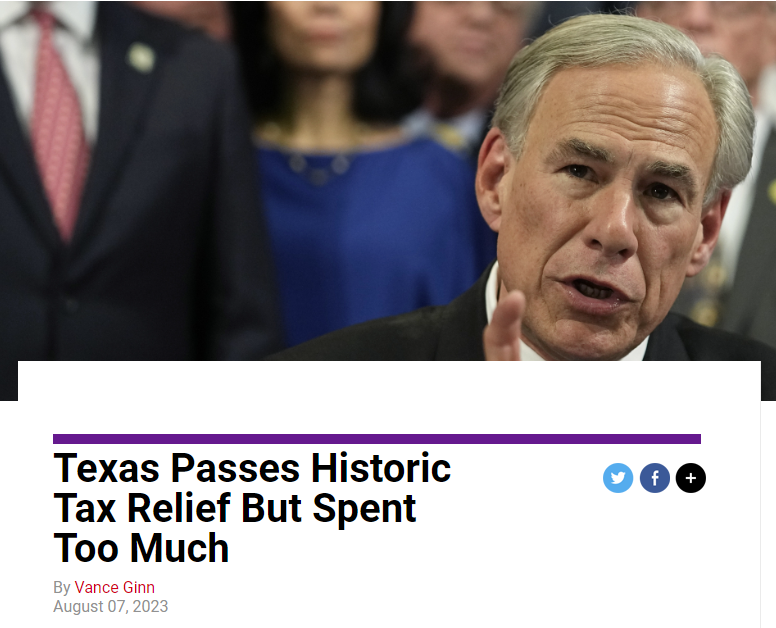
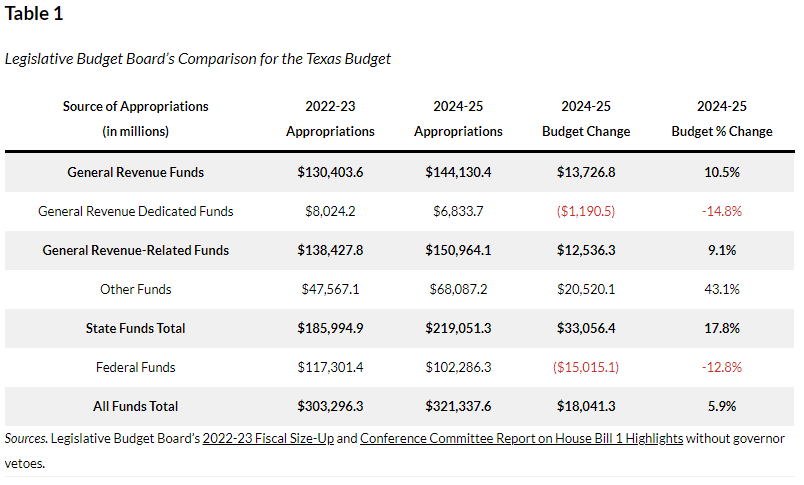
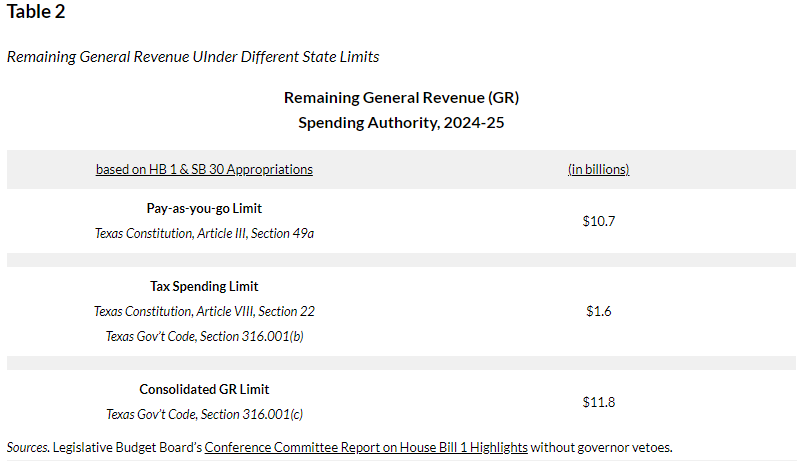
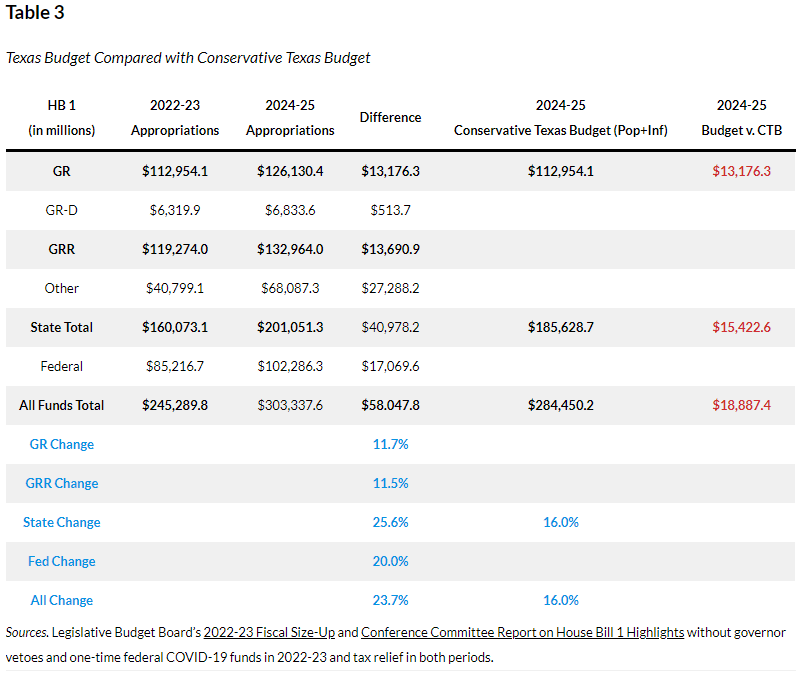
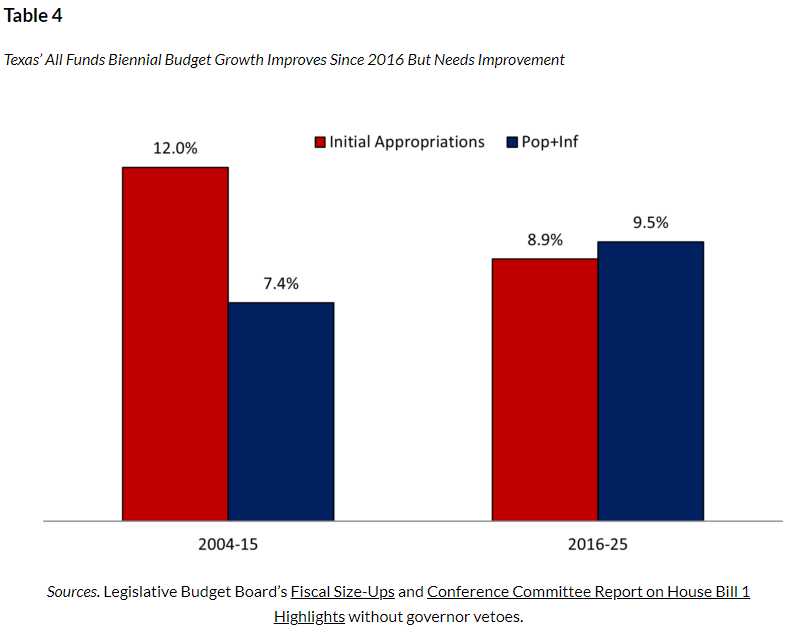
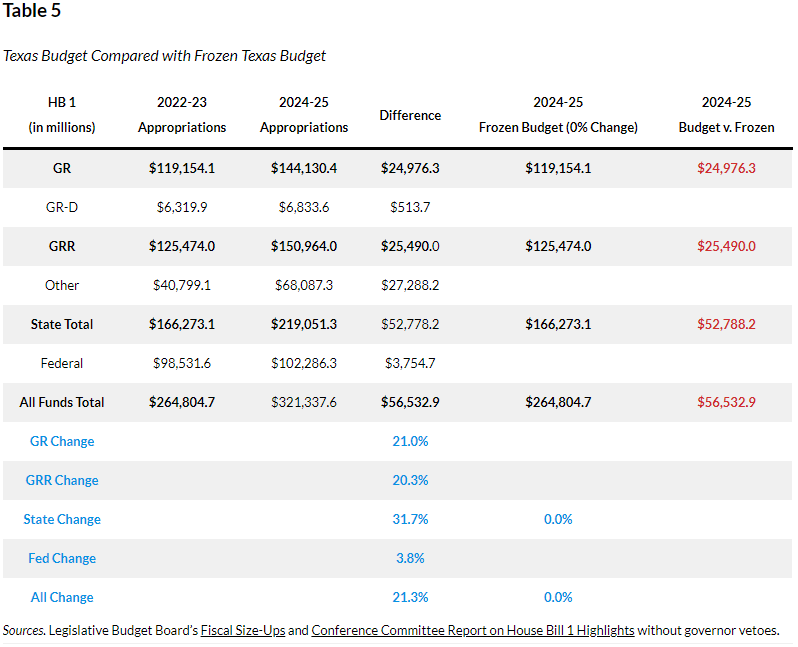


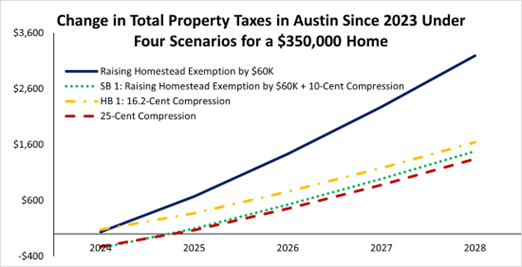
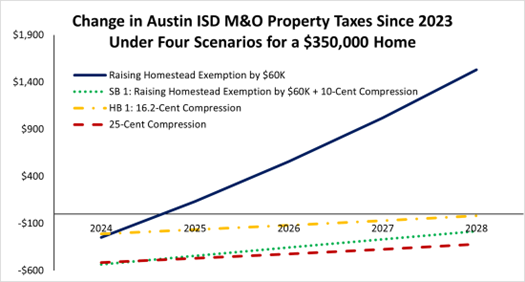
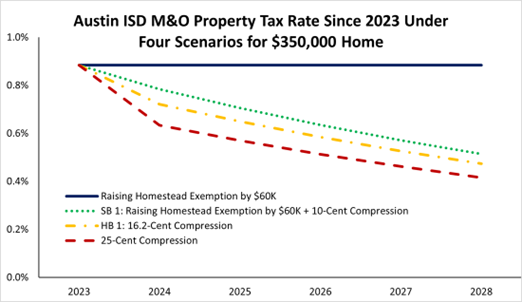
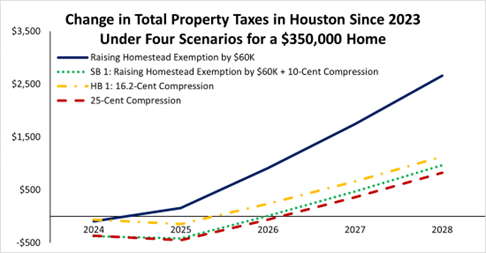
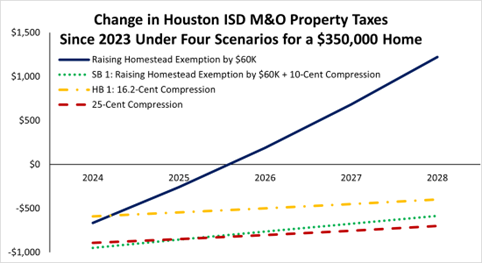
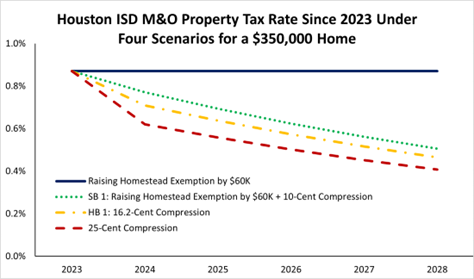
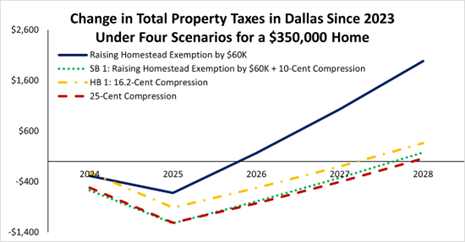
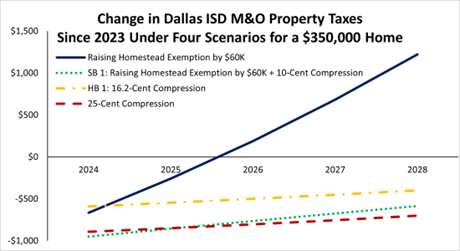
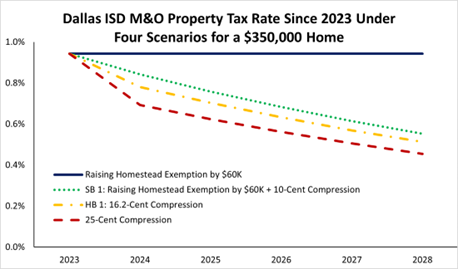
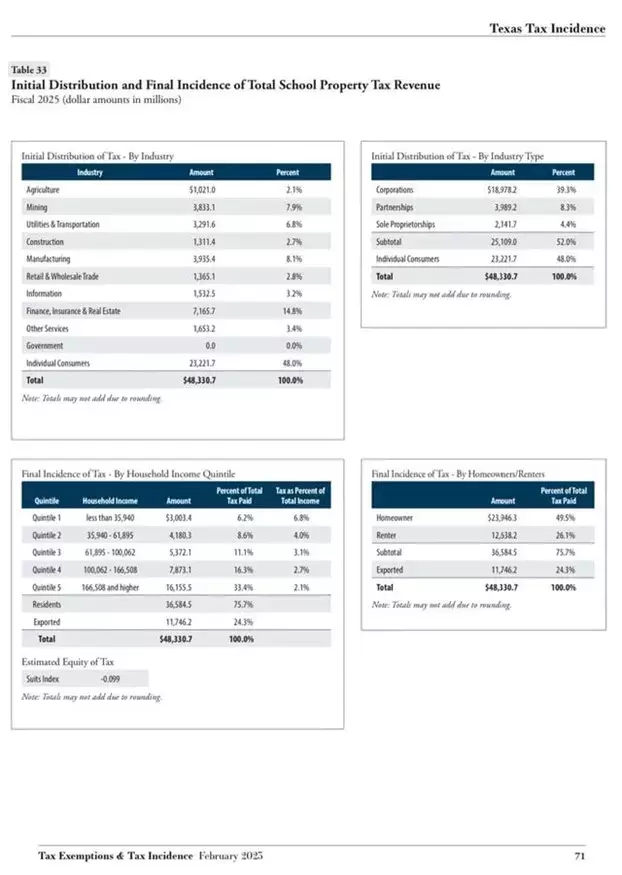
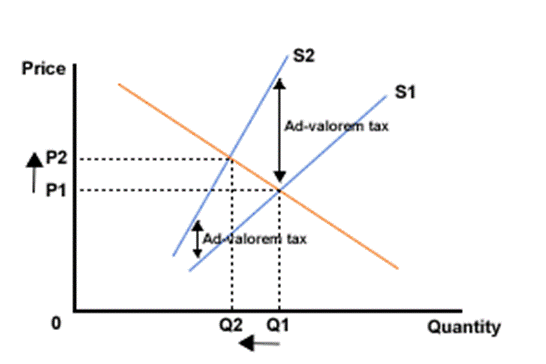
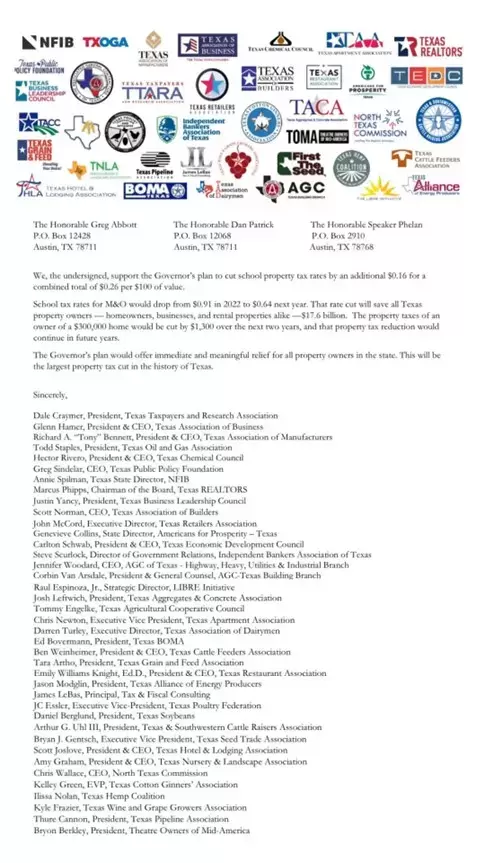
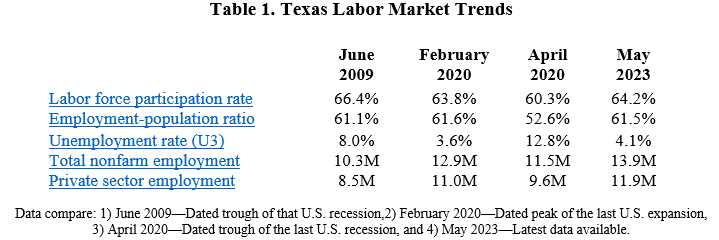
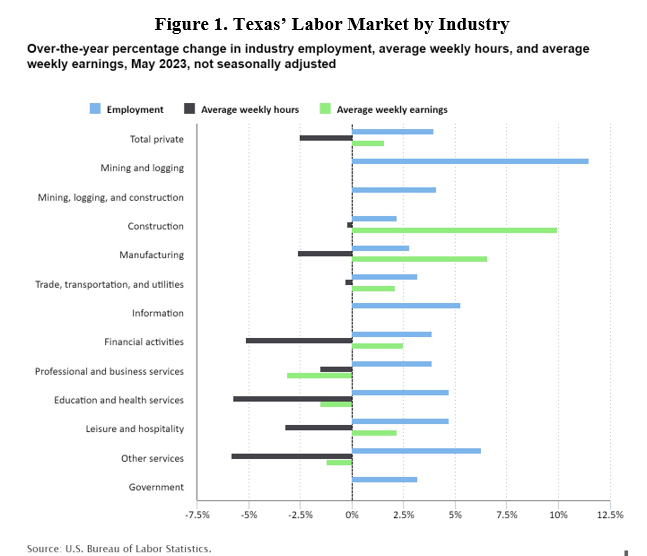
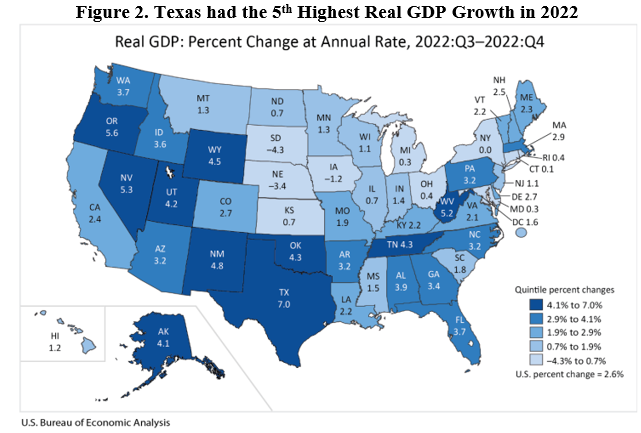
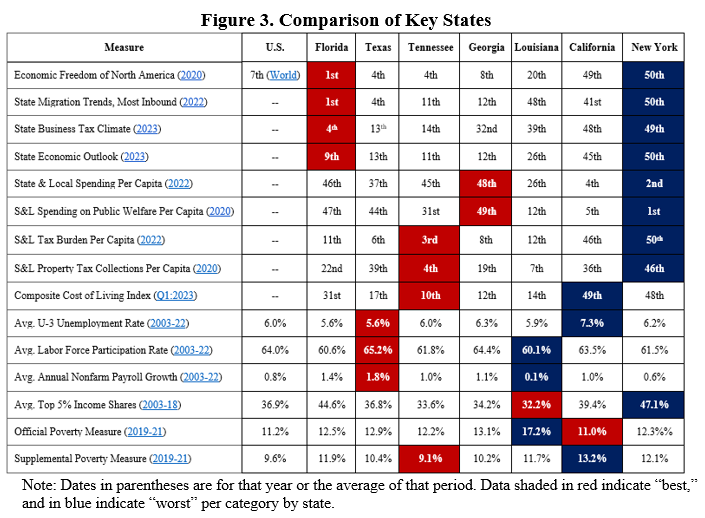

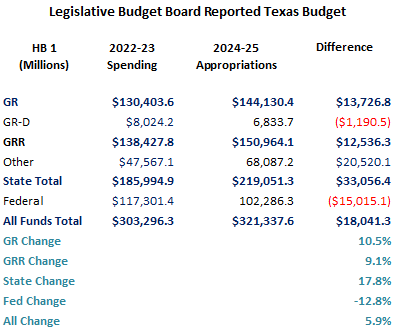
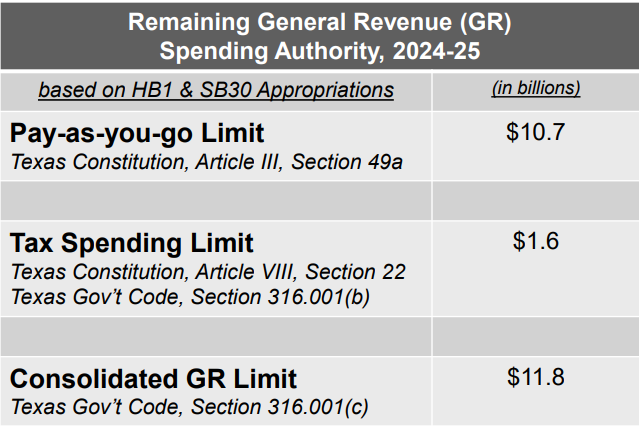
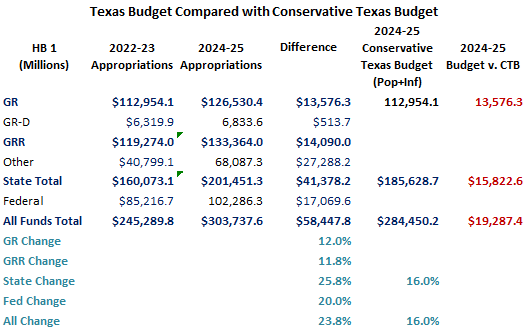
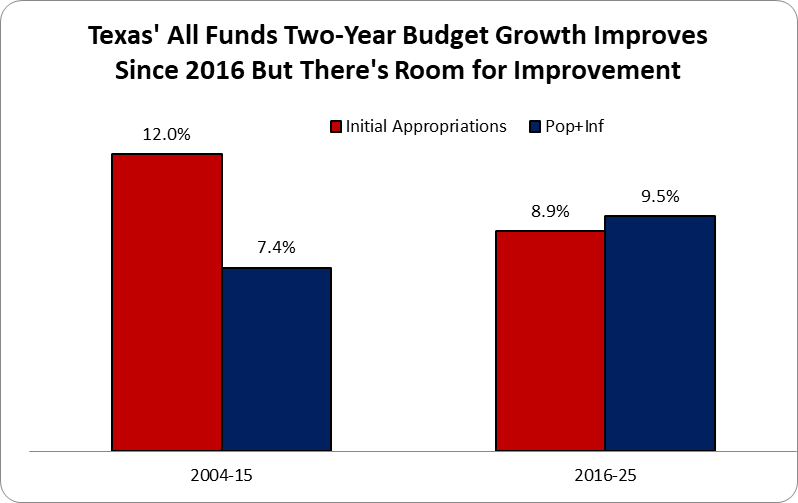
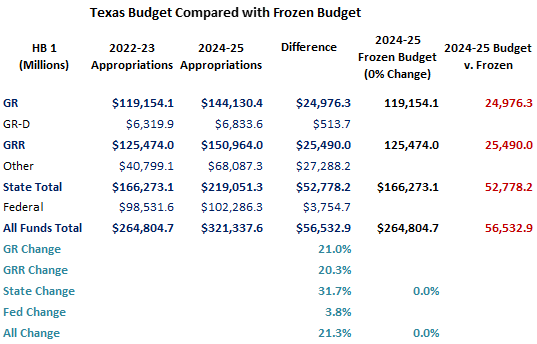
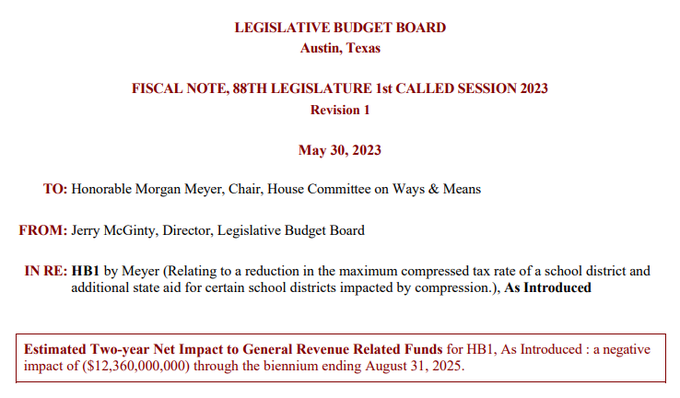
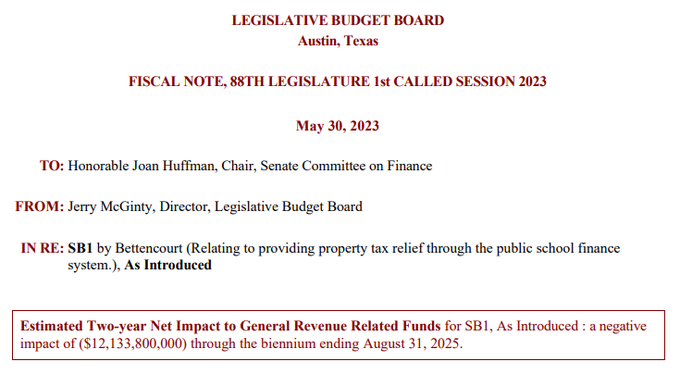

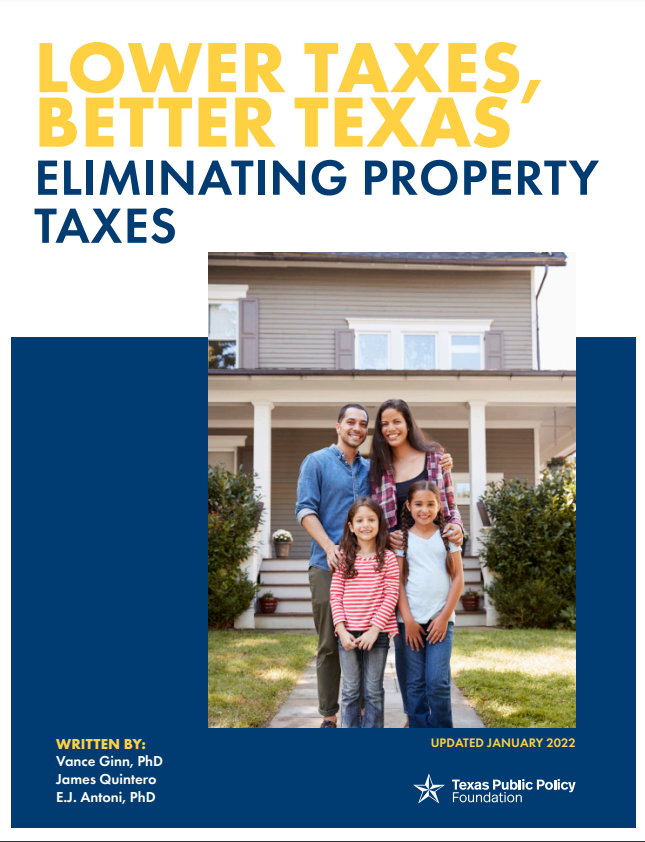
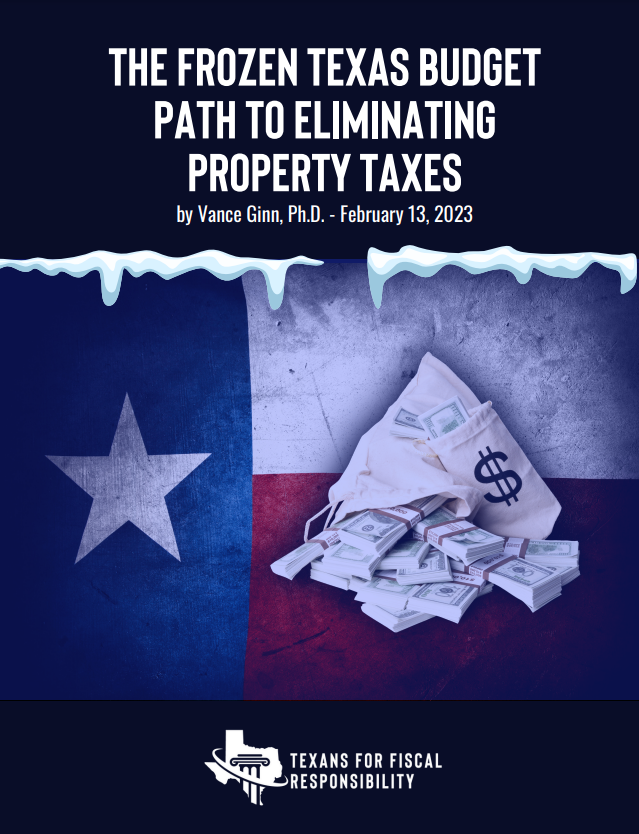
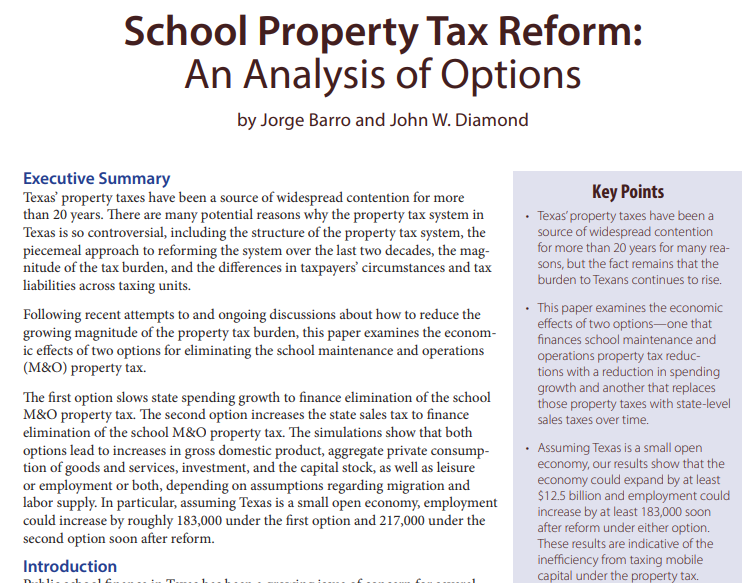
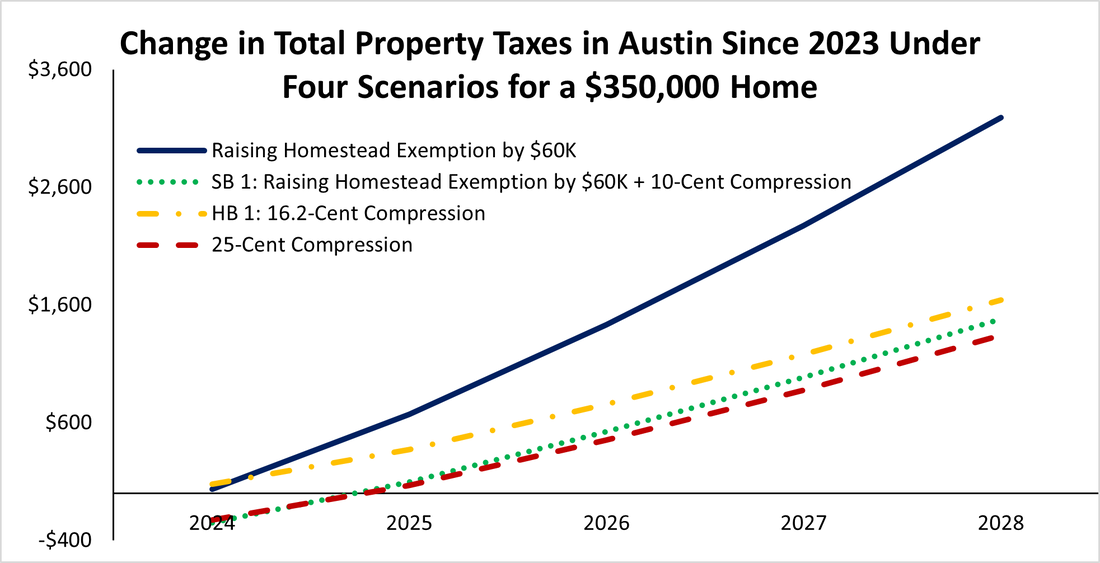
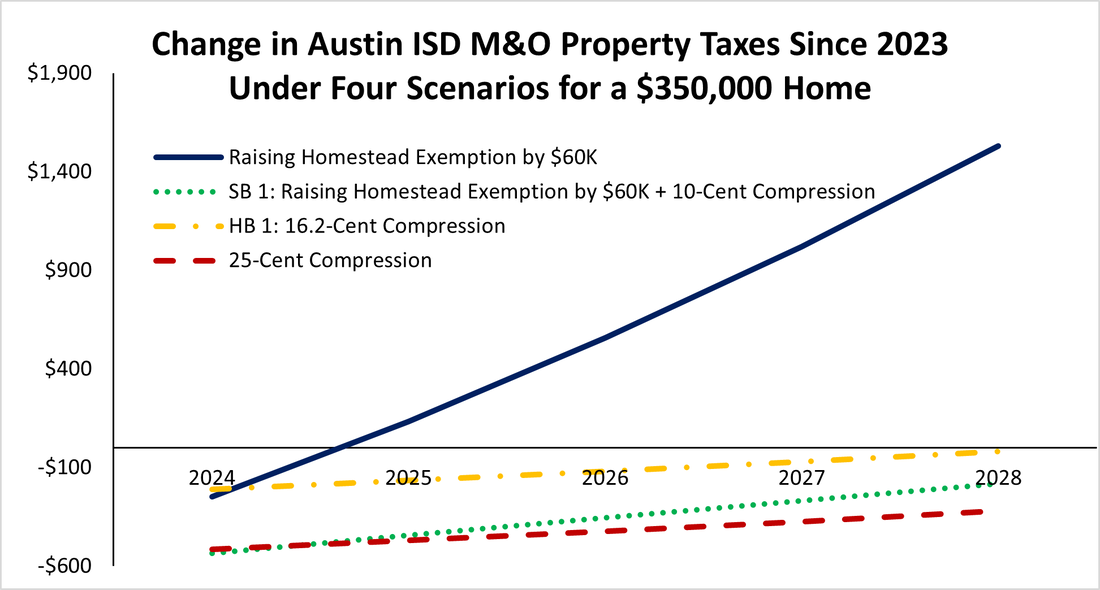
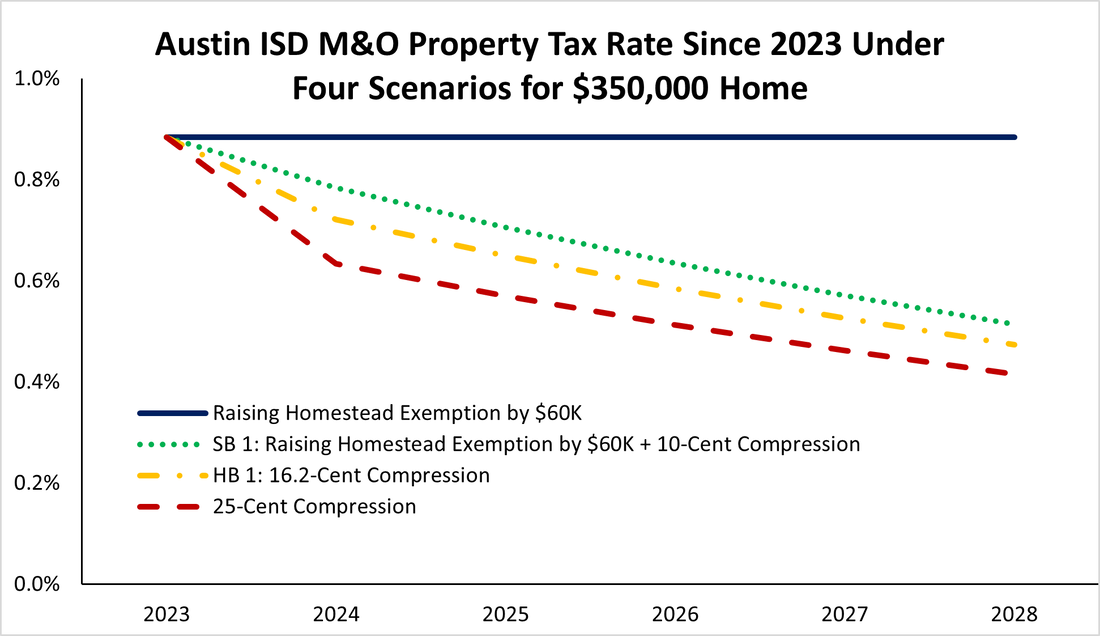
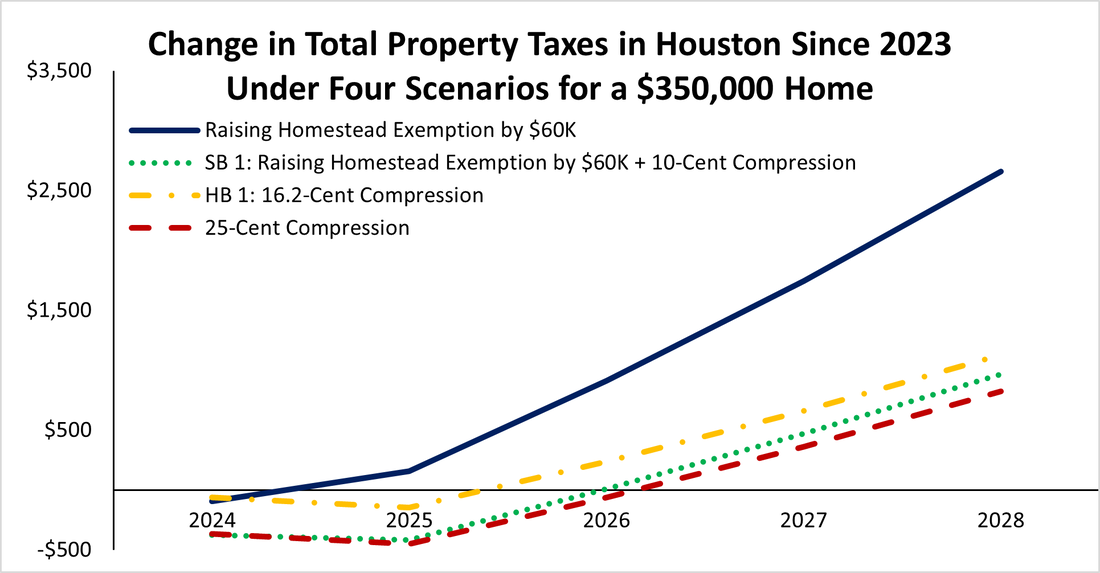
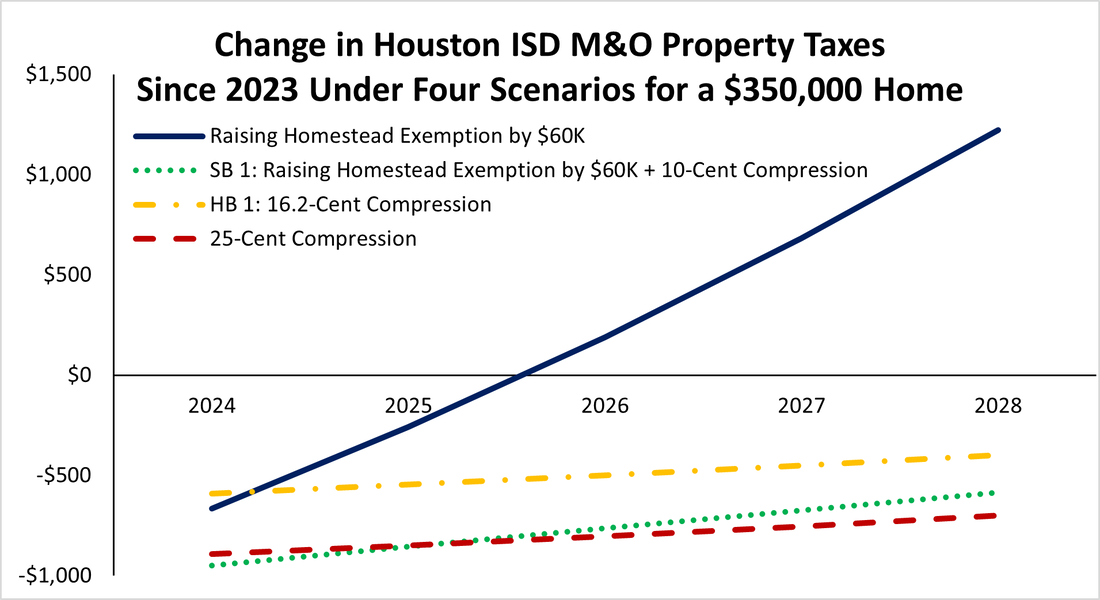
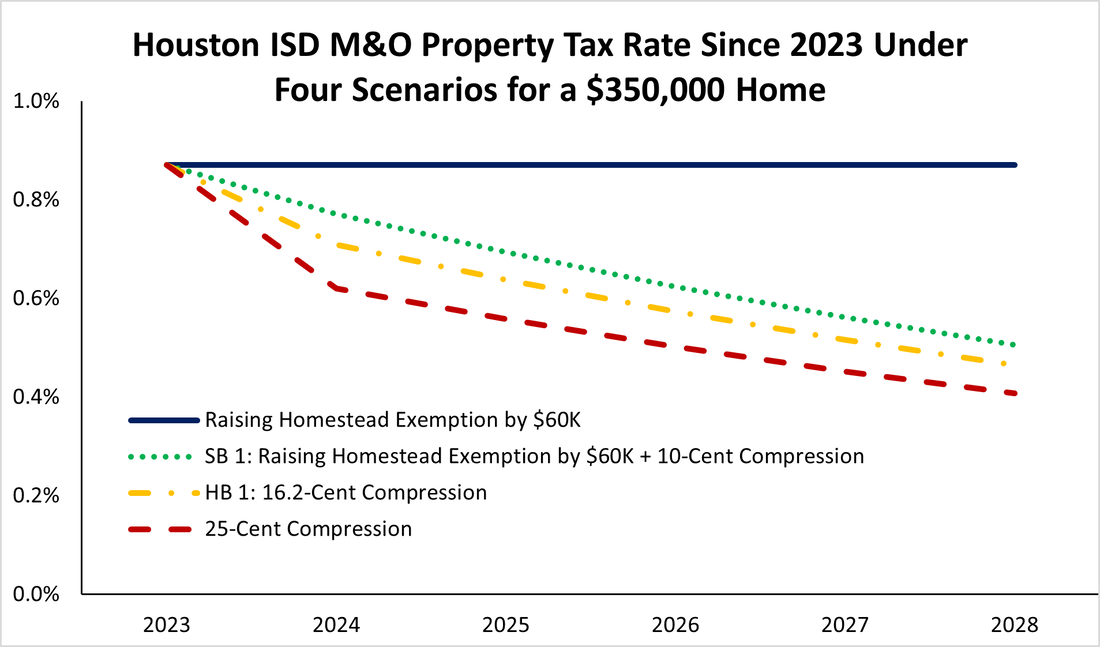
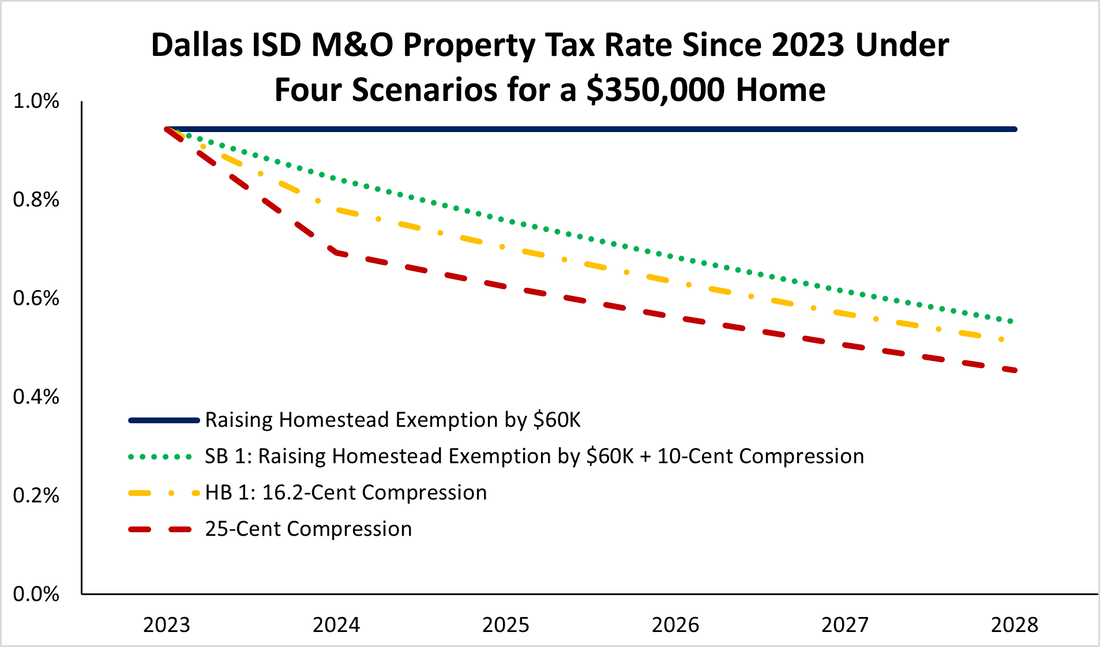
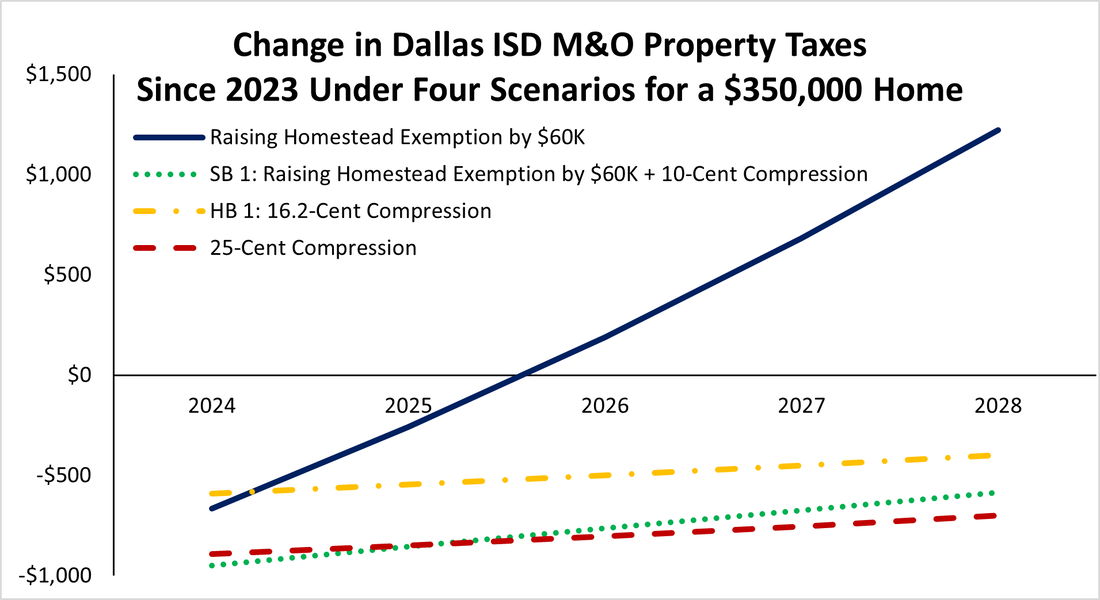
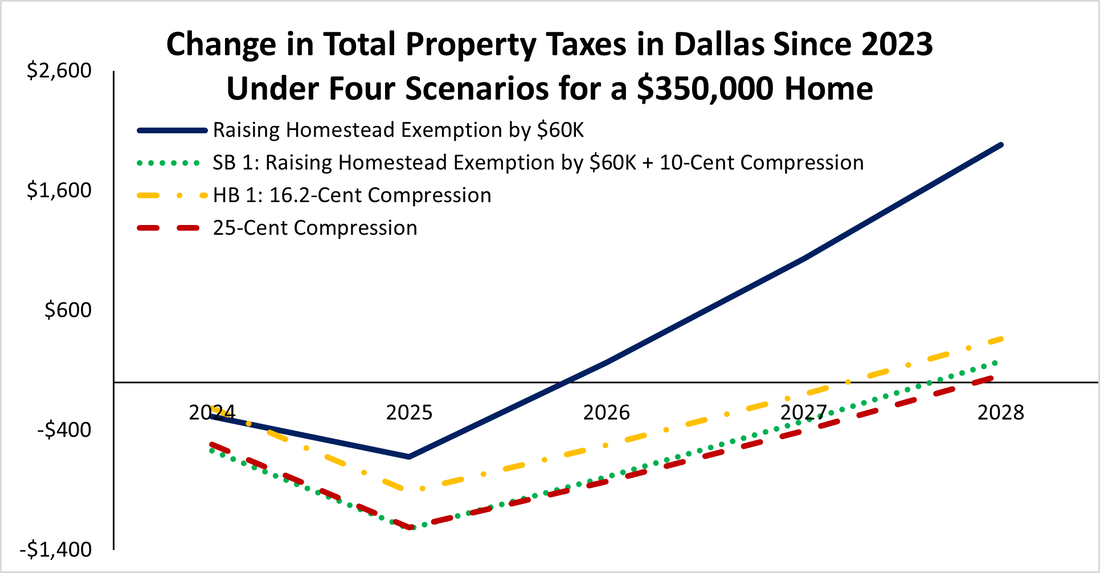
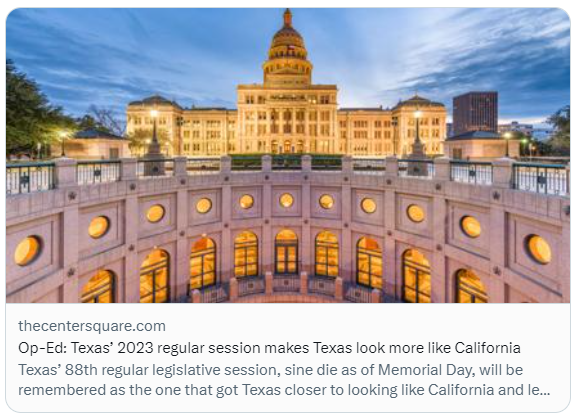
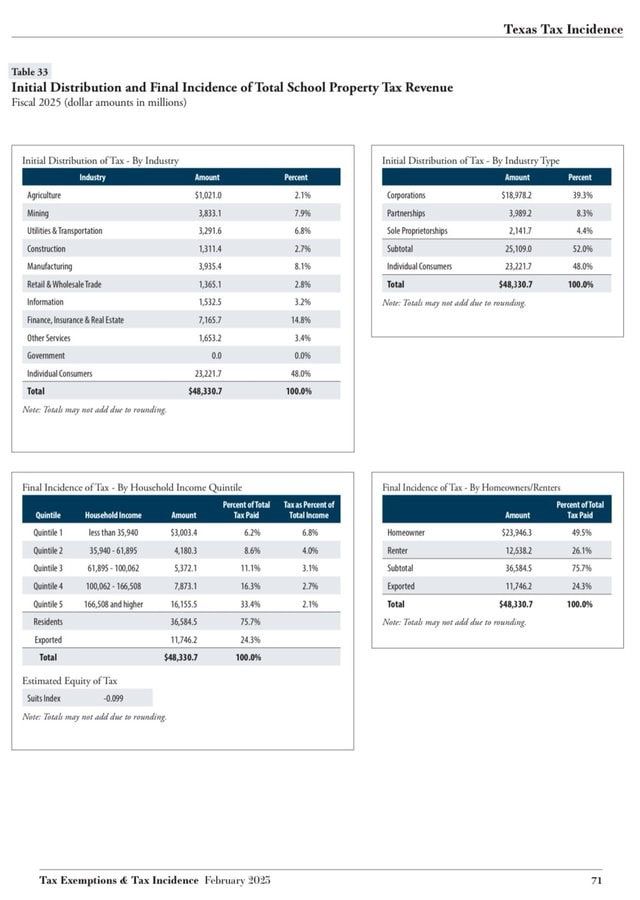
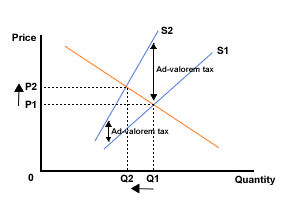
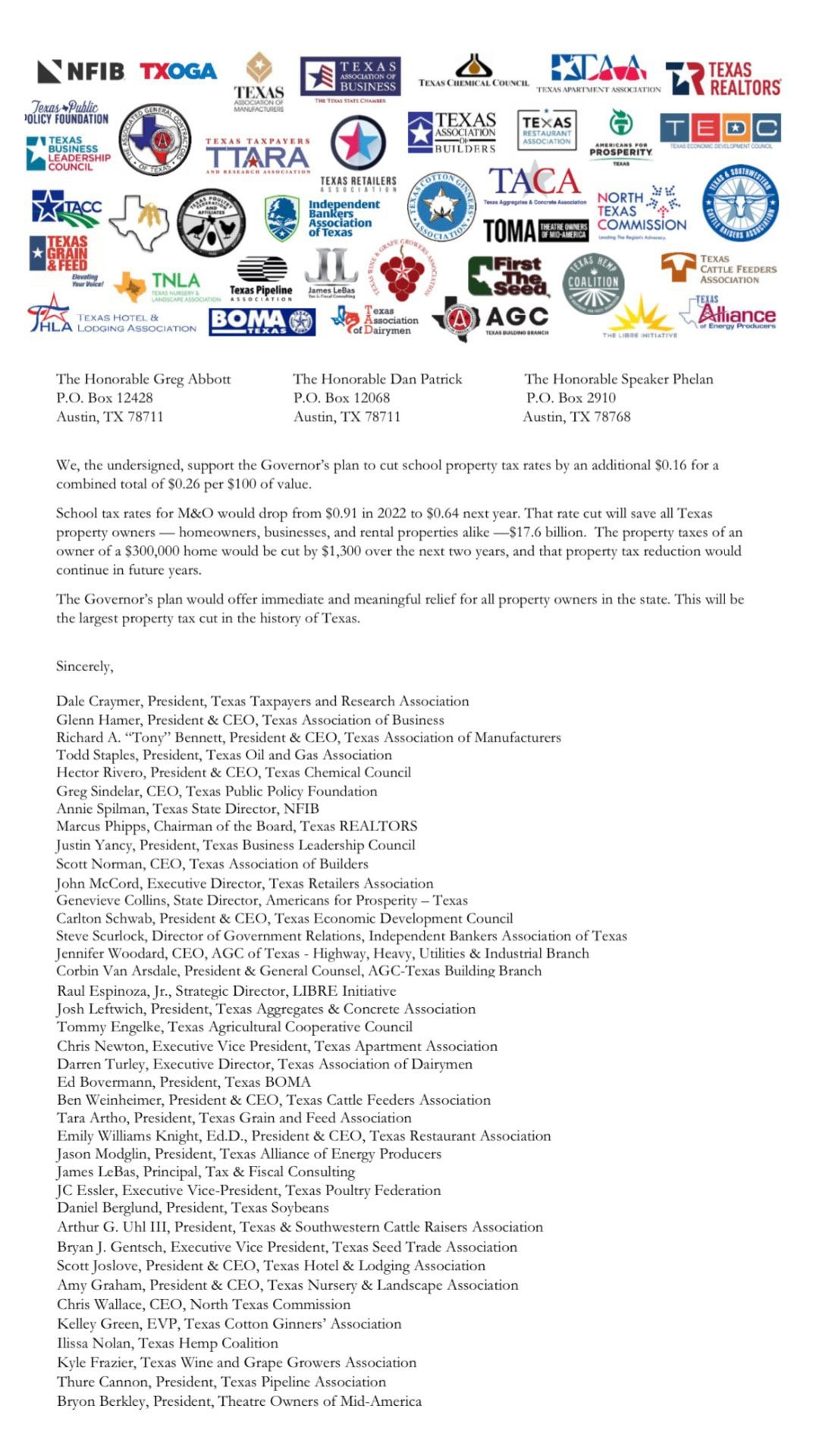
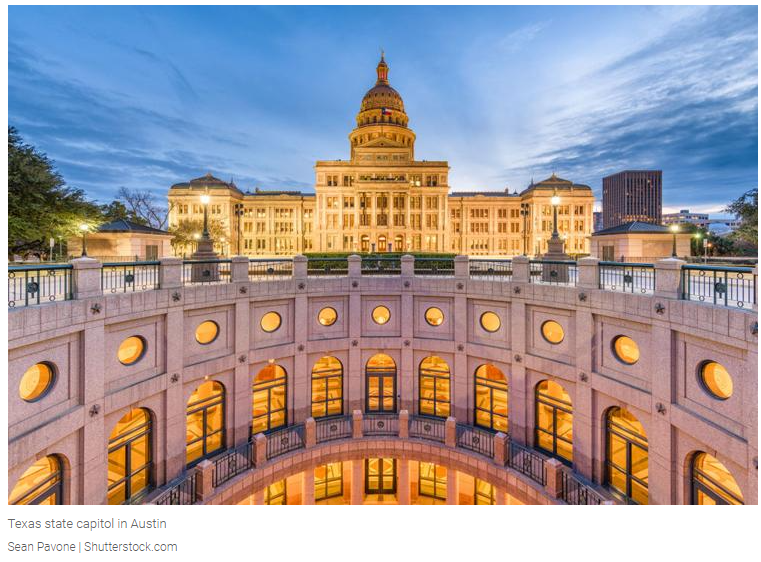
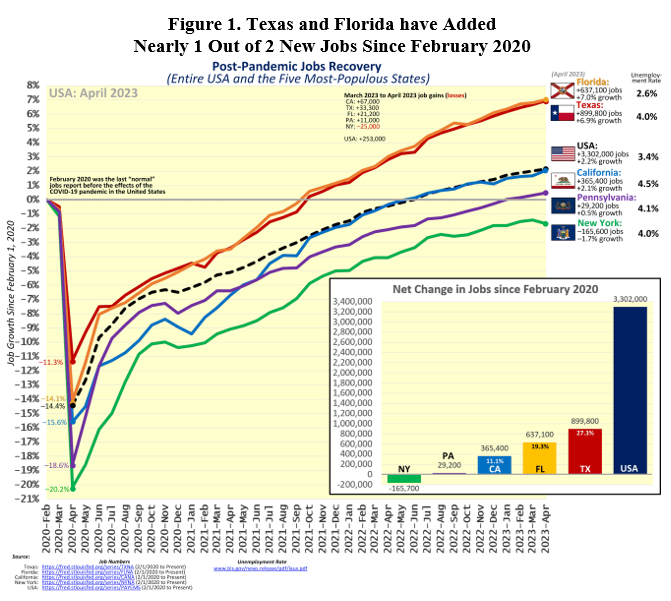
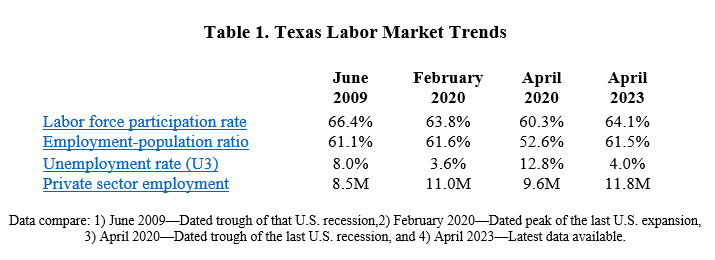
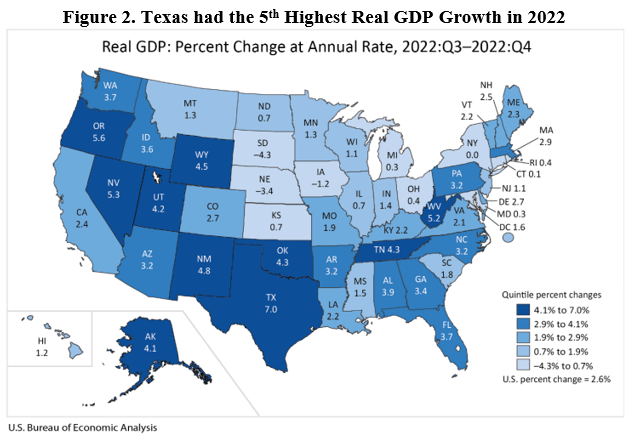
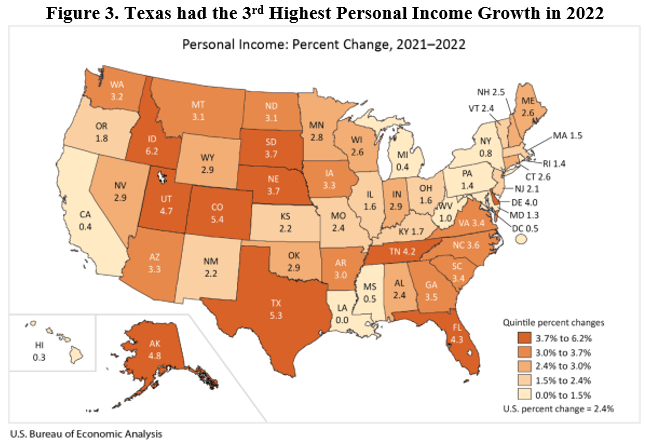
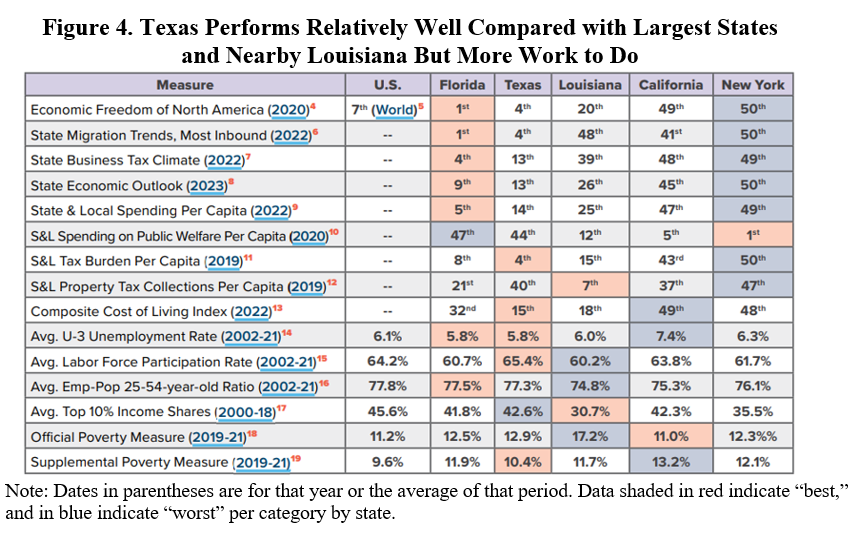
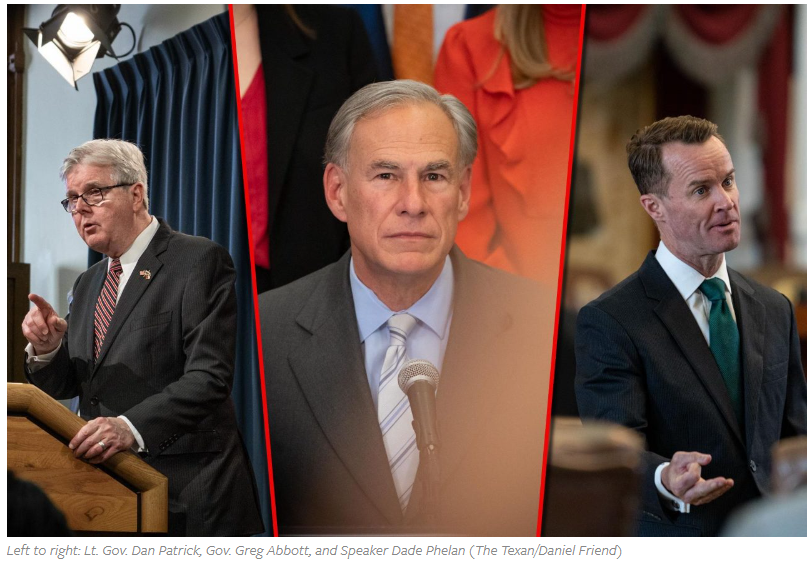
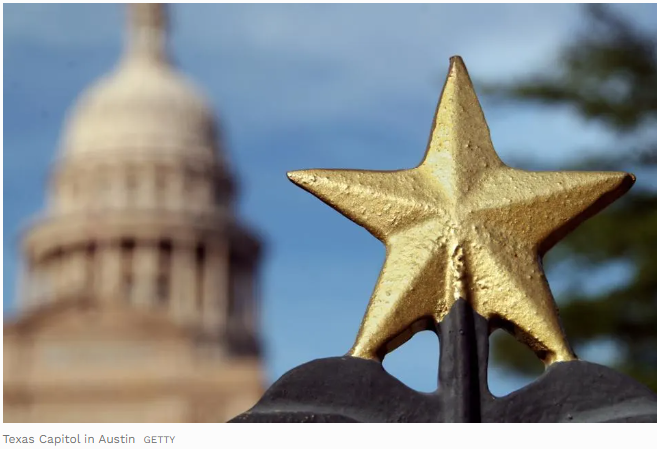

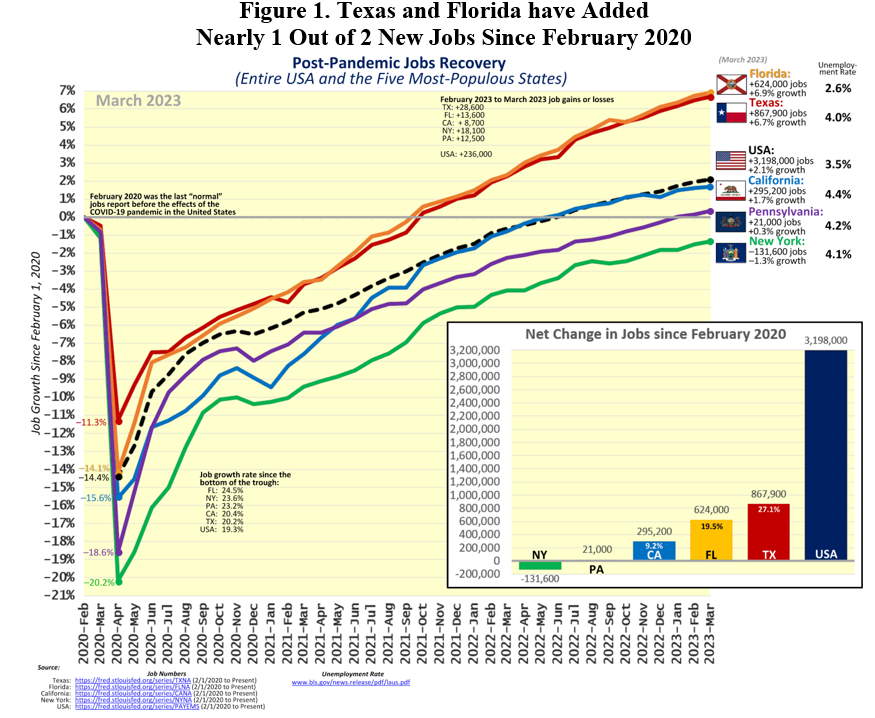
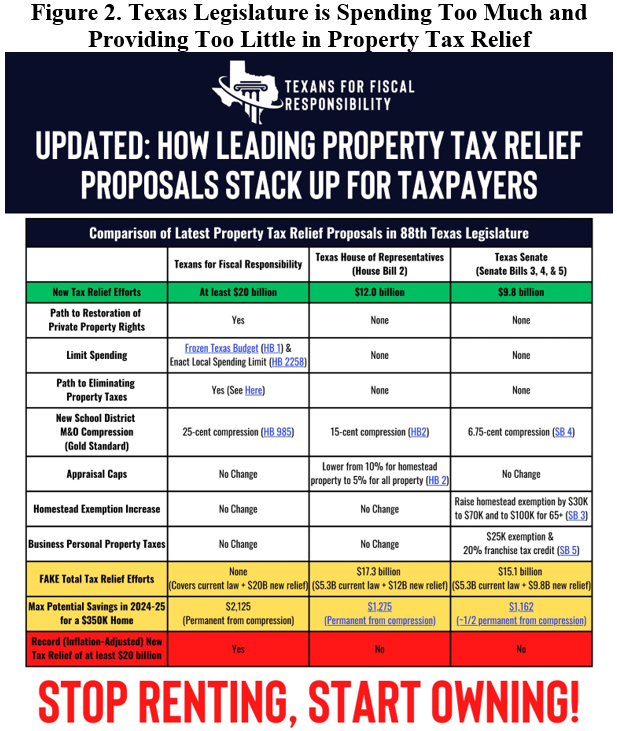
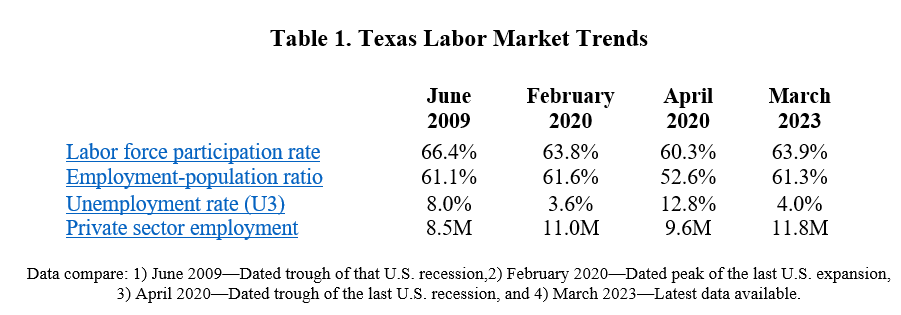
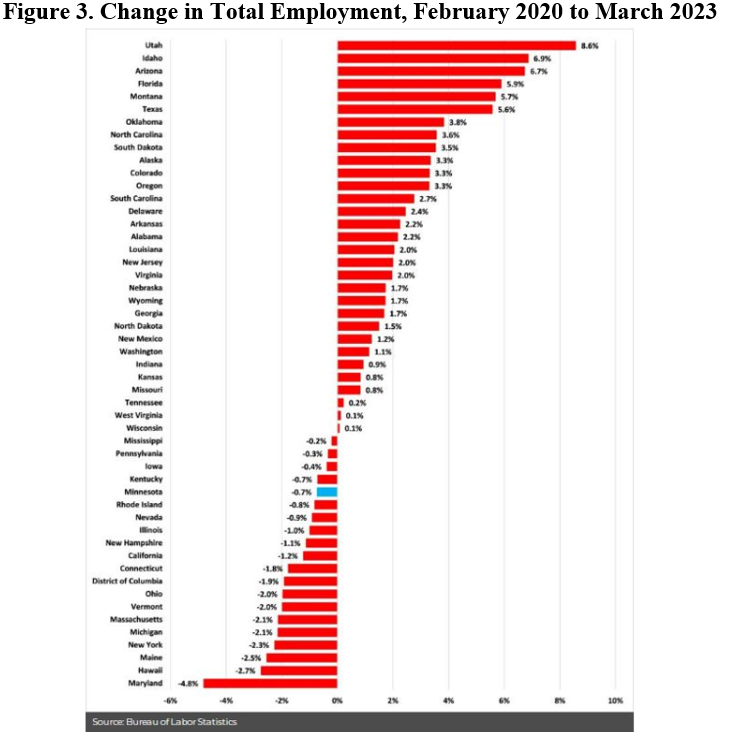
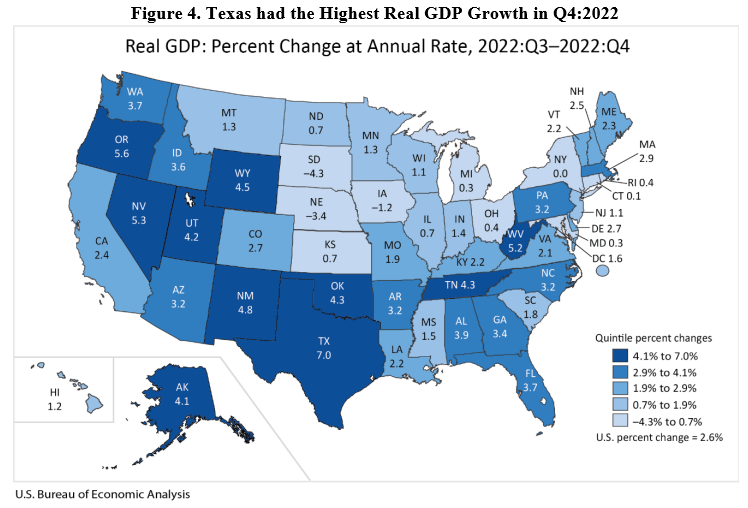
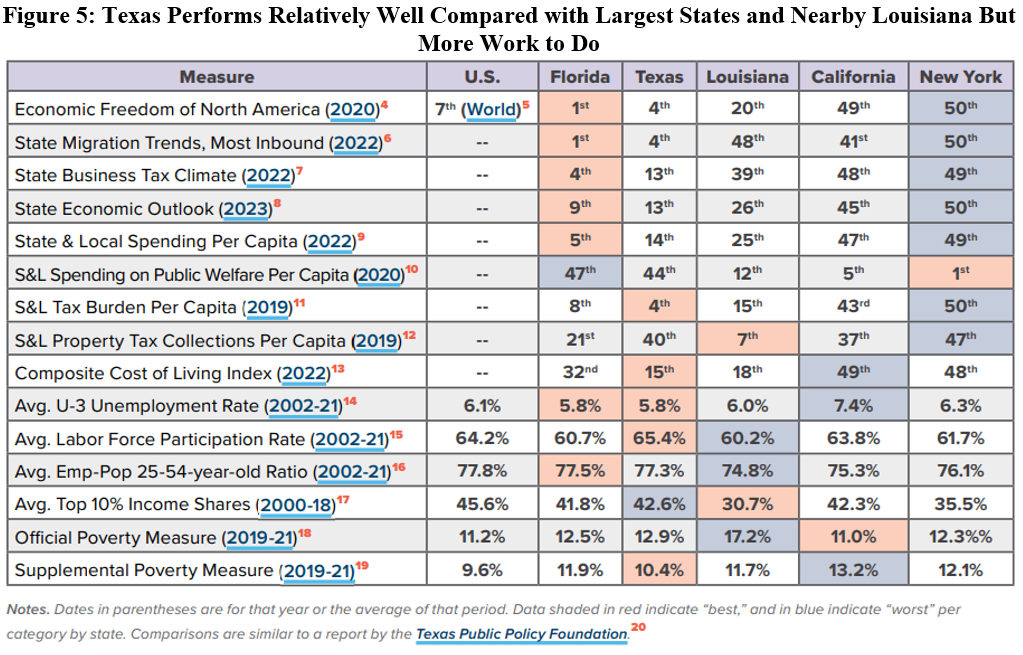
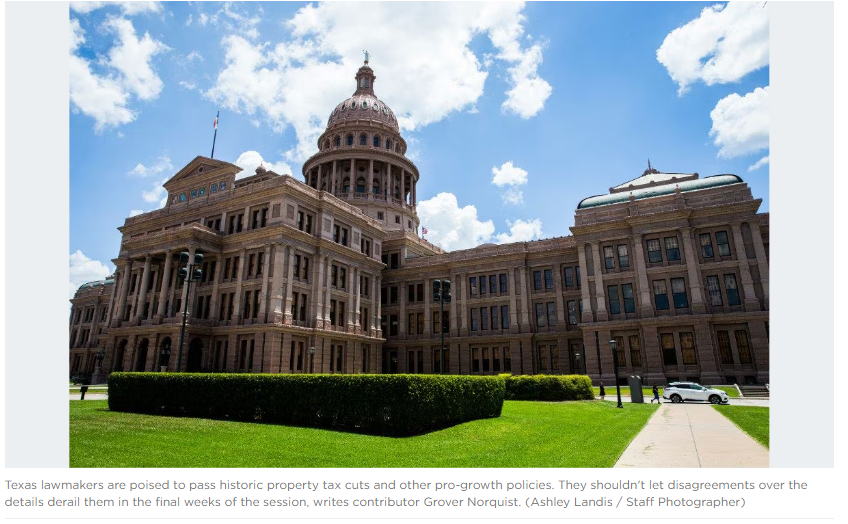
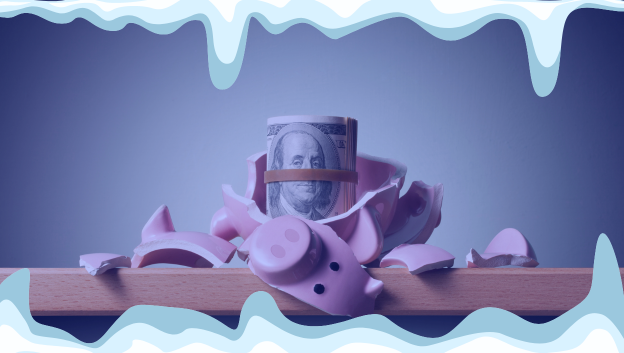
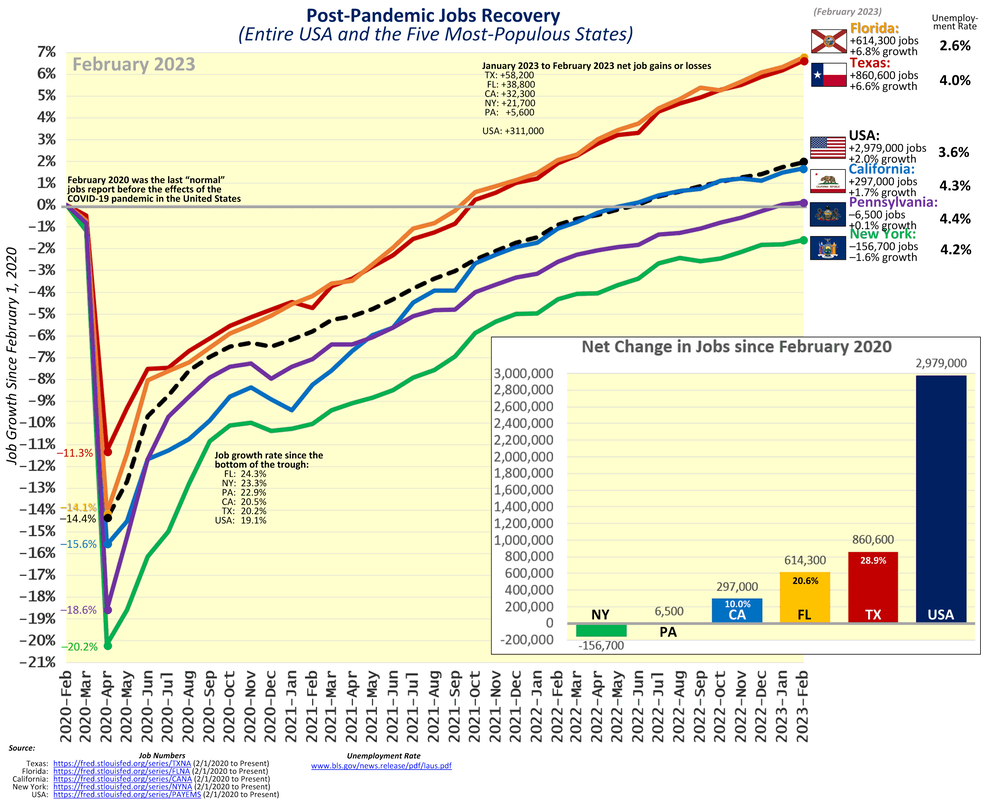
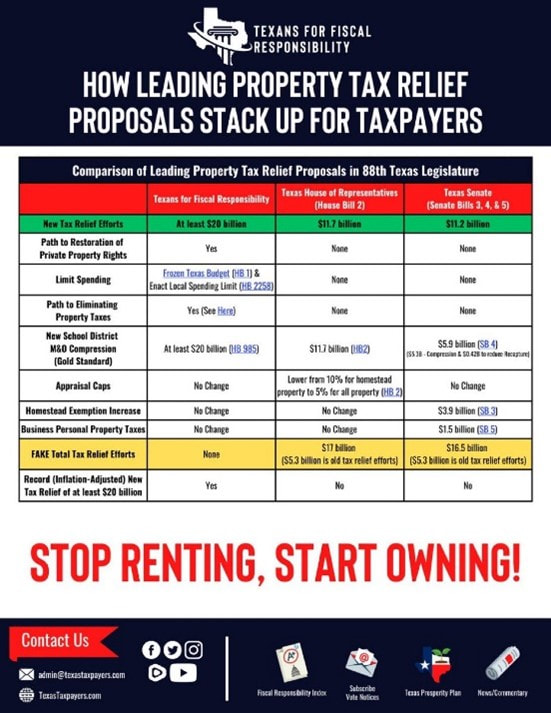

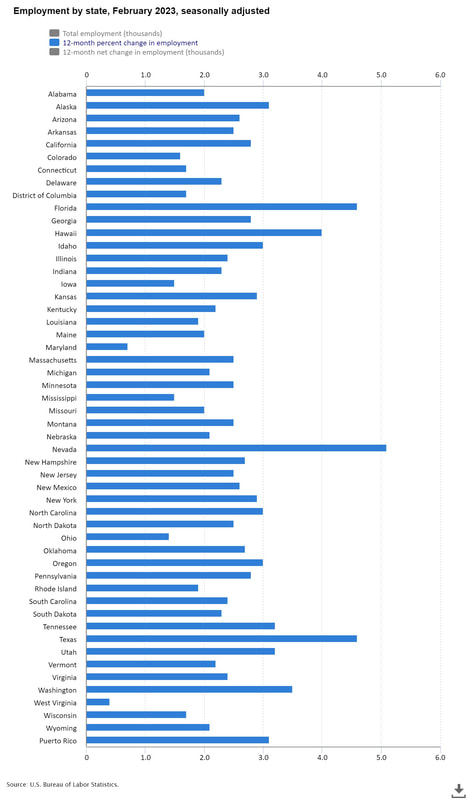
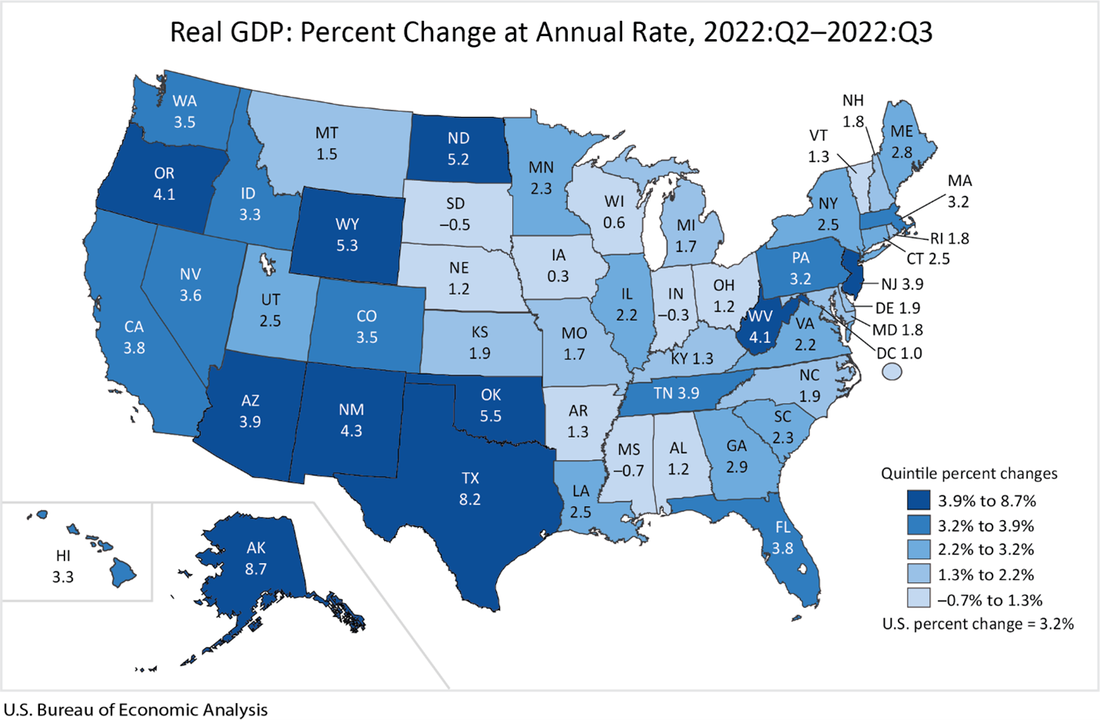
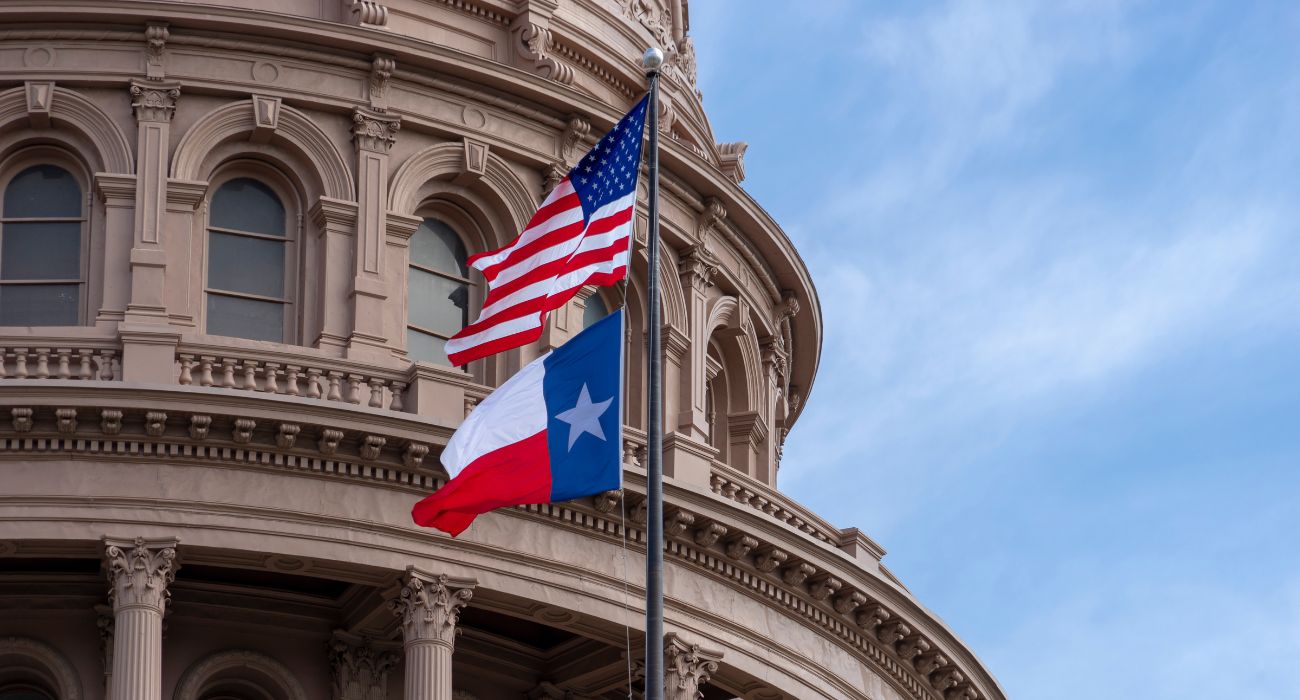



 RSS Feed
RSS Feed